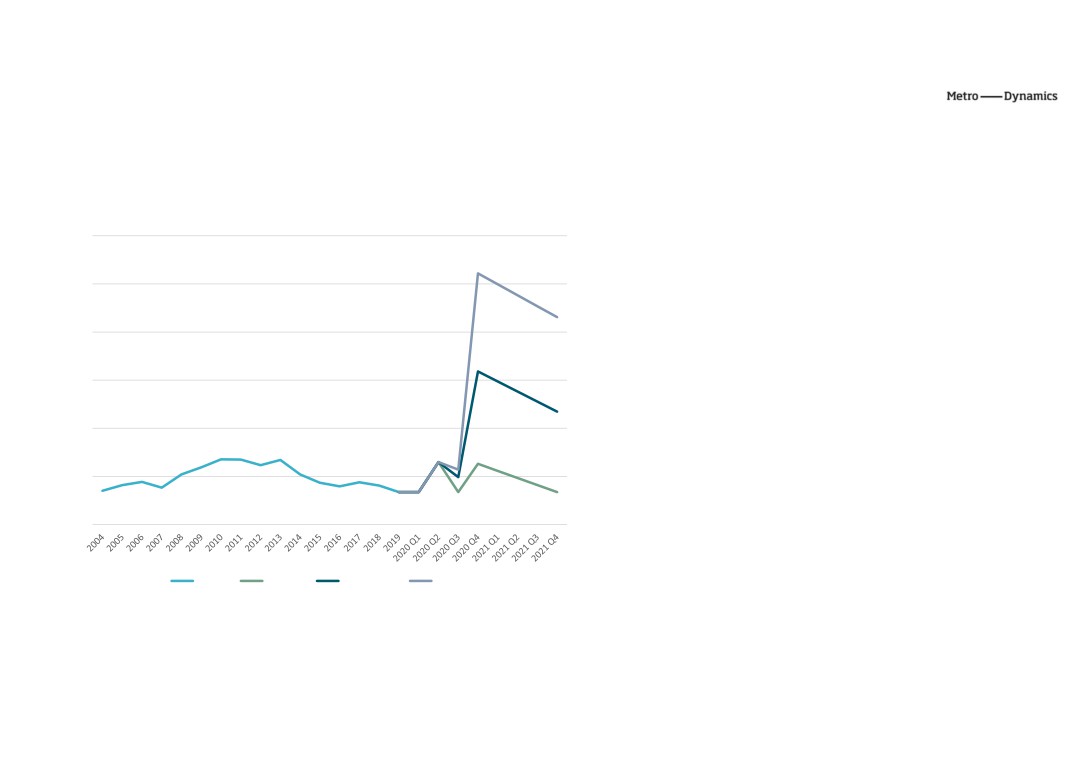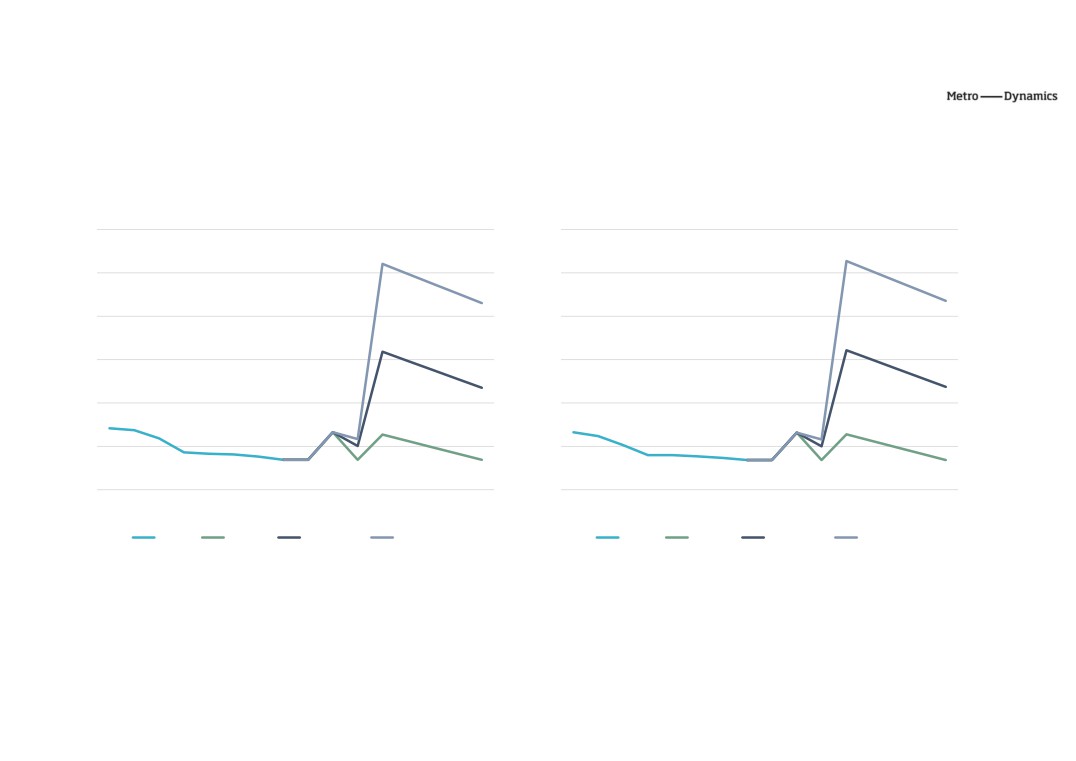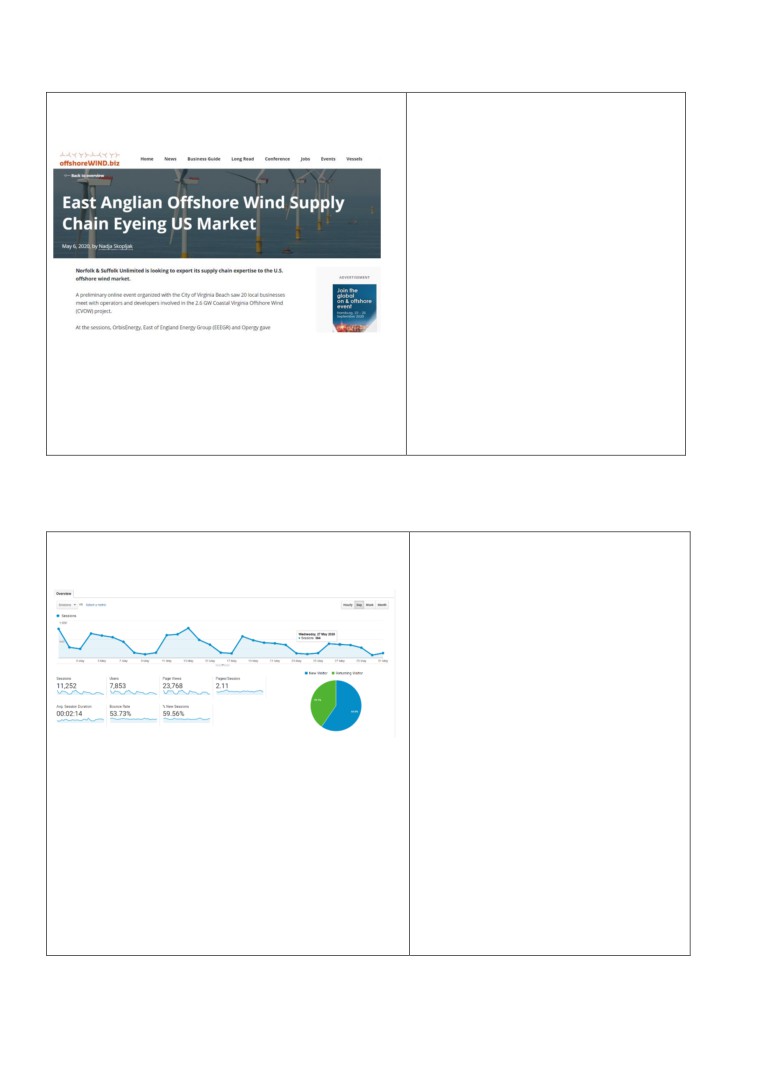New Anglia Local Enterprise Partnership Board Meeting
Meeting by conference call
Tuesday 23rd June
10.00 - 12.00pm
Via MS Teams
Agenda
No.
Item
5 minutes
1.
Welcome from the Chair
2.
Apologies
3.
Declarations of Interest
4.
Actions / Minutes from the last meeting
5.
LEP Response to COVID-19
Update
20 minutes
6.
Covid-19 Economic Recovery Plan
For Approval
30 minutes
7.
Impact on Employment
Update
20 minutes
8.
LEP Continuing Business - including confidential items
Update
15 minutes
9.
June Performance Reports
Update
10 minutes
10.
LEP Operating & HR Policies
For Approval
10 minutes
11.
Board Forward Plan
Update
5 minutes
12.
Any Other Business
5 minutes
Next Meeting: 10.00-12.00, Tuesday 21st July
1
New Anglia Board Meeting Minutes (Unconfirmed)
20th May 2020
Present:
Sam Chapman-Allen (SC)
Breckland Council
Claire Cullens (CC)
Norfolk Community Foundation
David Ellesmere (DE)
Ipswich Borough Council
Doug Field (DF)
East of England Coop
C-J Green (CG)
Brave Goose
John Griffiths (JG)
West Suffolk Council
Matthew Hicks (MH)
Suffolk County Council
Pete Joyner (PJ)
Shorthose Russell
Helen Langton (HL)
University of Suffolk
Dominic Keen (DK)
Britbots
Corrienne Peasgood (CP)
Norwich City College
Andrew Proctor (AP)
Norfolk County Council
Johnathan Reynolds (JR)
Opergy
Alan Waters (AW)
Norwich City Council
Jeanette Wheeler (JW)
Birketts
Attendees
Kathy Atkinson (KA)
Kettle Foods
Mark Ash (MA)
Suffolk County Council
Sue Roper (SR)
Suffolk County Council
Vince Muspratt (VM)
Norfolk County Council
Shan Lloyd (SL)
BEIS
Chris Dashper (CD)
New Anglia LEP - For Item 6
Chris Starkie (CS)
New Anglia LEP
Rosanne Wijnberg (RW)
New Anglia LEP
Helen Wilton (HW)
New Anglia LEP
1
Actions from the meeting: (20.05.20)
Restart and Rebuild - Covid-19 Economic Recovery Plan
To receive a paper on the effects of the Covid-19 crisis on employment in the region
N Waller
Investment Appraisal Committee Nominations
Private sector board members to forward nominations for the vacant position on the IAC to
Private
RW
Sector
1
Welcome from the Chair
Doug Field (DF) welcomed everyone to the meeting and welcomed C-J Green, Kathy Atkinson and
Mark Ash.
2
Apologies
Apologies were received from Tim Whitley, Sandy Ruddock and Steve Oliver.
3
Declarations of Interest
Jeanette Wheeler, (JW), Corrienne Peasgood (CP) and Andrew Proctor (AP) declared an interest in
Item 7 - Growing Places Fund Food Innovation Centre Investment.
Full declarations of interest can be found at http://www.newanglia.co.uk/about-us/the-board.
4
Minutes of the last meeting
The minutes were accepted as a true record of the meeting held on 21st April.
5
LEP Response to COVID-19
Chris Starkie (CS) presented the paper to the board and highlighted key areas.
CS confirmed that the first applications to the Resilience and Recovery Scheme had been
received with the first application processed and funds paid out within 10 days. Enquiries
continue to be received and the fund has a healthy pipeline.
The vacancies page on the LEP website has proved successful with 2000 views in the first
week in May. Work is ongoing to improve the functionality of the pages.
The PPE database has 300 suppliers registered of which 50% are local companies offering
850 different types of PPE. 198 users from the care sector have registered as users. The
next phase is to open it up to businesses and provide access to products assisting them in
getting employees back into the workplace.
The meeting discussed promotion of the scheme and the successful applicants and CS
confirmed that all would be promoted as soon as all commercial details had been finalised.
Matthew Hicks (MH) noted that Suffolk County Council were setting up a similar database
and CS confirmed that the LEP were in regular conversation with SCC on activities.
Communications teams from the LEP also hold regular meetings with counterparts from
local authorities to ensure that all messages are consistent.
The Board agreed:
• To note the content of the report
6
Restart and Rebuild - Covid-19 Economic Recovery Plan
CS reviewed the paper noting that the proposed approach was also being presented to the
Norfolk and Suffolk Leaders for approval.
The plan aims to work with local partners to build a phased approach to economic recovery
beginning with a 12 month tactical restart phase providing practical support to businesses
which will be followed by a 3-5 year strategic plan.
2
Claire Cullens (CC) highlighted the importance of the Voluntary Sector (VS) as a key
partner which would provide opportunities for skills development and employment in the
future.
CS agreed and confirmed that each sector would have its own workplan and that sectors
would be broader than those detailed in the Local Industrial Strategy (LIS). It was agreed
that those key sectors identified in the LIS would not be lost but would be widened with
other sectors included.
The board agreed that it was important for the tactical plans to be in place as soon as
possible.
CS confirmed that the restart phase would focus on activity and the rebuild phase would
incorporate details from the LIS and the Economic Strategy (ES) to provide a new strategy
to be published next summer.
Johnathan Reynolds (JR) stressed the support for rebuilding using clean growth and noted
the potential jobs losses in the oil and gas industry could impact heavily in the region
CS confirmed that clean and inclusive growth would be part of the plan and, although the
establishment of the Clean Growth Taskforce has been delayed, it could form part of the
next phase.
Helen Langton (HL) asked whether the Norfolk & Suffolk Unlimited branding would be used
in the plan and suggested that the use of the word “unlimited” be incorporated to stress the
continued belief in the local economy.
HL also noted the significant impact the crisis was having on unemployment and skills and
felt that this area needed to be given more emphasis with reference to upskilling and
redeployment.
CS confirmed that the NSU brand would be included and that references to key Brexit
dates and impacts would be added as per MH’s request.
The Board noted the concerns that that significant numbers of redundancies were possible
when the furlough scheme ended.
It was agreed that the Board would receive a paper on redundancies and economic
impacts at the next meeting.
CS noted that the plan was organic and had an aggressive timeline in order for it to be
signed off in June.
The Board agreed:
• To note the content of the report
• To endorse the development of a Norfolk and Suffolk economic recovery plan in two
phases Restart and Rebuild as outlined in the paper
N Waller
• To receive a paper on the effects of the Covid-19 crisis on employment in the region
7
Growing Places Fund - Food Innovation Centre Investment - Confidential
JW, CP & AP left the meeting
JW, CP & AP returned to the meeting
3
8
LEP Capital Budget 20/21- Confidential
Rosanne Wijnberg (RW) presented the budget and highlighted key items.
The Board agreed:
• To note the content of the report
9
Continuing Business
RW presented the paper to the Board and highlighted key items noting that the process for
identifying the next phase of Institutes of Technology was on hold but that discussions
were continuing with partners.
RW advised that the payments of Local Growth Funding had been split this year with 2/3
paid on in May with the remaining 1/3 in September subject to a review on the progress of
projects.
Growth Through Innovation Fund - JR asked for the programme to be linked to the
Innovation Board to ensure priorities are aligned. RW confirmed that she will contact JR to
make sure communication with the Innovation Board is maintained.
New Anglia Capital (NAC) - Dominic Keen (DK) updated the meeting on the discussions at
the latest NAC board meeting. DK asked for the Board’s approval for NAC to reduce its
conditions on employment and match funding requirements to allow companies to get
funding in place. CS confirmed the support of the LEP Executive team for the change and
JW offered to provide support on the parameters.
The amendments were agreed by the Board
The Board agreed:
• To note the content of the report
• To approve the amendments to the operating parameters of NAC as detailed
10
Management Accounts - Q1 2020
RW presented the quarterly management accounts to the board noting there was a rollover
of £16m in grants due to slower than anticipated spend.
JR asked if there were any themes to the delays across the projects.
RW advised that some were due to issues within the projects such as delays in obtaining
planning permission but more recent delays are as a result of the Covid-19 crisis. Projects
have been asked to review and restructure spend.
RW also noted that the audit is underway and is being carried out by uploading documents
to an online portal.
• To note the content of the report
11
May Performance Reports and Programme Dashboard
RW presented the reports for May and asked for approval of the Growth Deal Dashboard.
The Board agreed:
4
• To note the contents of the reports
• To approve the Growth Deal Quarterly Dashboard
12
Investment Appraisal Committee Chair, Vice Chair and Membership
RW advised the meeting that, following the departure of Lindsey Rix, there is a vacancy for
the role of Chair of the IAC.
RW confirmed that David Ellesmere (DE) and DK had been nominated for the roles of
Chair and Vice Chair respectively and asked for approval from the Board for both
appointments.
The appointments were approved unanimously by the Board.
RW asked for nominations from the private sector board members for the current vacancy
on the IAC.
The Board agreed:
• To endorse the appointments of David Ellesmere and Dominic Keen as Chair and Vice
Chair of the IAC
• For private sector board members to forward nominations for the vacant position on the
Private
IAC to RW
Sector
13
Board Forward Plan
CS advised that the agenda for the June meeting is being finalised and agreed that the
Economic Recovery Plan and an update paper on Brexit will be added.
The Board agreed:
• To note the content of the plan
14
Any Other Business
CS briefed the Board on the roundtable held with the Minister for Business and Industry
Nadhim Zahawi MP and the Minister for Regional Growth and Local Government Simon Clarke
MP in which New Anglia LEP participated along with the Oxford-Cambridge Arc LEPs. 5
current and one past LEP private sector board members participated and were able to pose
questions to the ministers.
5
Actions from New Anglia LEP Board Meetings
Date
Item
Action
Update
Actioned
Target Date
By
20/05/2020
Restart and Rebuild - Covid-19
To receive a paper on the effects of the Covid-19 crisis on employment in the region
Included in the June meeting papers
N Waller
Complete
Economic Recovery Plan
20/05/2020
To receive a proposal detailing how the £4.9m repaid loan funds may be used to support
Funds arestill available in both GBF and R&R to support recovery. The
RW
Jul-20
Capital Budget 20/21
recovery
aim is to bring a paper to the July Board
20/05/2020
Investment Appraisal Committee
Private sector board members to forward nominations for the vacant position on the IAC to
Private
Jul-20
Nominations
RW
Sector
26/02/2020
Clean Growth Taskforce
Board members to consider a pledge which the Board could make and submit suggestions to
All
Nov-20
the Chair.
25/06/2019
GE Update Report
To provide the Board with regular reporting of the pipeline of visits relating to inward
An update on all the enquiries received will be provided monthly as part
DD
Complete
investment and subsequent outcomes
of the Continuing Business Report
23/05/2019
Growth Hub Presentation
Growth Hub Annual review to be circulated to the Board when published
The reviwe will now be published in Autumn 2020 to include the period
CD
Nov-20
since March.
9
New Anglia Local Enterprise Partnership Board
Tuesday 23rd June 2020
Agenda Item 5
LEP Response to COVID-19
Author: Marie Finbow
Presenter: Chris Starkie
Summary
This report provides the board with an update on the LEP’s response to the coronavirus
pandemic.
The LEP continues to work closely with a wide range of partners on our response to Covid-19
including all Norfolk and Suffolk local authorities, business groups such as the chambers and
FSB, colleges, universities and LEP sector groups.
Through the response phase, the focus has been on gathering business intelligence and
providing financial and other support to businesses, as well as action to support the workforce
and key sectors.
Over the past few weeks attention has increasingly focused on the recovery phase, as
businesses look to restart and rebuild.
The first phase of the economic recovery plan - Restart - is covered separately on the agenda.
This report provides a headline update on the activities undertaken by the LEP team covering
both phases since the May board meeting.
Recommendation
The LEP Board is asked to note the contents of this report.
Background
As previously outlined to the board, the LEP’s Covid-19 response is structured under the
following workstreams:
1. Business Intelligence
2. Business Support and Advice
3. Local Funding
4. Workforce
5. Sectors and Supply Chain - Sub workstreams include: Personal Protective Equipment
(PPE), Visitor Economy, Agri Food, Energy and Construction.
6. Economic Recovery Plan
7. Communications
Since the last board meeting the emphasis has shifted from short term business advice and
funding, to the restart and rebuild elements of the economic recovery.
Set out below is a summary of the key activity which has taken place within each of these
workstreams over the last few weeks.
1
11
1 Business Intelligence
Intelligence reports continue to be submitted to Government on a weekly basis. Information
is typically gathered from around 50 different sources each week including local authorities,
businesses and sector groups. A trends document is also produced weekly and circulated to
local authorities, business intermediaries, sector groups and the East of England Local
Government Association, providing week by week trends from the intelligence returns
submitted.
Key trends from intelligence reports submitted in May:
New Anglia Growth Hub:
The 1st week of May saw the highest number of enquiries (113) and the highest level
of interactions with as many longer/more detailed appointments as telephone/basic
signposting, but the overall trend for May is a decreasing one (75% reduction from
enquiries on 1st May compared with those on 22nd May); telephone/basic signposting
down 52% and longer/more detailed appointments down 74%. Similarly website hits
have seen a reduction by 66% during May.
Continued trend of highest number of enquiries coming from the manufacturing,
wholesale and retail trade and accommodation and food service sectors.
Largest number of enquiries in May (47%) relate to government small business grant
fund and grants/finance.
General intelligence
Small businesses and the self-employed are still struggling to access government-
initiated support.
Recovery will take longer than expected with the ability to maintain social distancing
and cash flow cited as two key concerns.
Supply chain and safety of operations continue to hold back the construction sector.
Various sectors and business intermediaries have expressed concerns about a 14-
day quarantine period for arrivals to UK and ensuring workers are not turned away
during this busy period. Particular issues raised by the food sector and Norwich
Airport.
The Voluntary, Community and Social Enterprise Sector’s most significant issue is
medium term finances and if the situation continues for 12 months, 31% of
organisations report they would be at the point of failure.
Businesses in the hospitality sector have identified challenges around their
commercial viability with current social distancing measures, particularly those with a
lack of outdoor space.
Norfolk and Suffolk Venues Consortium has highlighted the impact on its 19 live
performance venues across Norfolk and Suffolk projecting a total collective loss of
income to the end of September 2020 of £15,389,450.
The Zoological Society of East Anglia have announced a survival business plan,
cutting almost 70 jobs. At the heart of this plan is a proposed restructure with urgent
cost cutting measures which will protect the life of the charity in the unprecedented
circumstances of Covid-19.
A number of businesses have identified the need for maintained business
engagement during the test, track and trace programme as it could potentially cause
whole sites and businesses to shut down. It is important that businesses include this
in any contingency plan they pull together.
2
12
2 Business Support / Advice
The Growth Hub is continuing to provide support to businesses through its phone-based
service. This service complements on the ground support provided by local authority
colleagues.
During May, the Growth Hub received 437 incoming telephone calls, a reduction from 977 in
April and 933 in March. Email enquiries since March are now standing at 1,164.
The majority of these enquiries have been Covid-19 related but more recently there has
been a return to other enquiries, including grant enquiries as businesses are looking to
resume trading.
Peer to peer network
The LEP is in the process of developing a Peer to Peer Network scheme in response to a
funding call from BEIS.
This is a new scheme targeting SMEs in the Agri-food, Manufacturing, Visitor and Health
and Social Care sectors.
It will provide up to 200 SMEs with peer to peer support initially delivered online, with
workshops when the lockdown is lifted.
The scheme will match experienced SMEs to assist others in areas such as the business
change cycle, tech adoption and leadership/management.
It will form a key component in the ramping up of business support in the Restart plan.
Further information will be provided once we receive confirmation of the bidding process
from BEIS, but we expect to be able to launch the scheme in September.
3 Local Funding
The LEP’s new Business Resilience and Recovery Scheme has seen a significant increase
in interest. As of Monday June 15th, 19 applications have been approved with a total value of
just over £440,000. Together with match funding from applicants the total investment in the
19 projects is more than £1m.
Examples of Business Resilience and Recovery Scheme grants issued include:
Sudbury print and design firm Indigo Ross investing in new printing presses to print
on a wider range of materials
Norwich theatre company Curious Directive transforming a Medieval church into a
laboratory for ground-breaking theatre projects
Funding for product development for Beccles-based Twyfords to support growing
demand from small shops and for home deliveries
New kitchen equipment for Wisbech farm shop Worzals to support demand for home
deliveries
A new CNC cutting machine for Pegasus Profiles in Thetford to bring more work in
house
New equipment for Ipswich indoor climbing centre Clip ‘n’ Climb to allow it to be sued
by more climbers while maintaining social distancing
New machinery for automotive engineers TTV Industrial, in Ipswich, to develop a new
range of parts for European clients
Press releases for some of the projects are attached at appendix 1.
Another six applications going through the due diligence and approval process and there are
a further pipeline has 39 proposals. Together these 45 proposals have a value of £1.9m.
3
13
The fund has £3.5m available - which means that awarded projects and those in the pipeline
now account for roughly two thirds of the fund value.
At the current rate of applications, the fund will therefore be fully allocated within a few
months. Therefore, further funding for the fund is being sought from Growth Deal Round 4.
Interest in the LEP’s other business grant programmes is also picking up. Further
information on these can be found in the LEP continuing business report (item 8).
4 Workforce
Work continues on identifying workforce challenges and gaps across sectors, working with
partners and the Department for Work and Pensions.
The employment opportunities webpage continues to attract significant attention, with almost
3,000 views in May. There are around 150 listings with most of these having more than
position available. Most popular areas are Health & Social Care, Food & Farming and Food
Retail.
More information on employment is captured in the employment paper elsewhere on the
agenda (item 7).
5 Sectors and Supply Chain
Sub-workstreams include PPE, Visitor Economy, Agri-Food, Energy and Construction.
PPE and return to work equipment
The LEP’s PPE supplier database has been upgraded with a new user interface, making it
easier to navigate and ensuring the database has up to date details of products.
Suppliers can now automatically update and amend products/records and users looking for
supplies can find information much more directly.
The database now has over 375 listed suppliers and producers of equipment to combat
Covid-19 with around 45% of the businesses listed based in Norfolk or Suffolk. Just over
1,500 products are now available on the system.
To date, more than 200 users have registered to use the system to source equipment to
combat Covid-19 - health care providers or other front-line services.
With the demand across care services reducing, focus has turned to what equipment
businesses need to safely reopen and information has been collated on return to work items
(i.e. sneeze screens, signage, hand sanitiser stations, etc).
The database currently has just over 250 ‘return to work’ items and the team are working
with Local Authority partners as well as the Chamber and Business Improvement Districts to
share information about suppliers. South Norfolk Council has procured ‘return to work
equipment’ for the public realm from companies identified through the database.
The database is now available to businesses wanting to purchase return to work items, and
was officially launched on June 8th ahead of the reopening of non-food retailers. The site had
5,500 viewers in the first five days following the launch.
A small number of companies who are looking for long term opportunities to pivot and
diversify production to PPE and ‘return to work’ equipment are currently working with the
Growth Hub team on grant applications for the Business Resilience and Recovery Scheme.
The team is planning to develop the database model further as part of the Restart plan to
look at supporting local food producers.
4
14
Visitor Economy
The Visitor Economy has a focussed Covid-19 Visitor Economy Group which is developing a
recovery plan for the Sector. This plan will be brought to the July board for sign-off.
Agri-Food
Effects of the pandemic on the Agri-food sector have been complex with the closure of the
hospitality industry having a major impact on producers. There has been an increase in
interest from the public in locally produced food which has been welcomed, with many
businesses setting up distribution channels. The labour challenges for the harvest remain a
huge concern.
Specific actions relating to Covid-19 impacts and recovery include support for the Flavours
Connexion project to match suppliers with potential trade buyers and consumers, so any
surplus food can be redirected.
The Agri-Food Council has a Delivery Plan in place which was written pre-Covid-19. This will
be rescoped/prioritised for recovery.
Key issues in the Agri-Food sector are being fed into Government.
The LEP is working with both Norfolk and Suffolk County Councils to undertake a research
project to set out opportunities for businesses to exploit new consumer trends.
Energy
Key intelligence/ concerns from the energy sector include the drop in the oil and gas price,
postponement of projects leading to job losses and concerns about the impact on the supply
chain. Offshore wind has remained resilient although concerns have been raised over
Government delays to the planning process for Vattenfall’s Norfolk Boreas windfarm. There
are also delays reported by EDF to the DCO process for Sizewell C nuclear newbuild.
Specific actions relating to Covid-19 impacts and recovery include:
The All Energy Industry Council met on 30 April and discussed current Covid-19
issues and challenges to recovery.
The East of England Energy Group (EEEGR) has surveyed its members and results
fed into the Business Intelligence returns.
Next meeting on 25 June will look at recovery of the sector and what actions are
needed.
Sub-groups including Building World Class research, All Energy Capability Matrix
and Cohesive Marketing Message have all continued to make progress with updates
expected at the meeting in June.
Other Sectors
Fishing
We continue to track and record issues in response to Covid-19 impact on this sector.
There have been severe restrictions on supplies to the ‘traditional’ customer base, namely
restaurants and pubs, due to lockdown, as well as export markets and the larger fishing
operators have mainly ceased to operate during this time.
Some smaller fishing vessels continue to operate off the Norfolk and Suffolk coast and to
help open up new direct customer channels, the LEP alongside Norfolk and Suffolk County
Councils and East Suffolk Council have worked together to support and promote the
Call4Fish platform in our region. Call4Fish is a digital platform established in the South West
to support the fishing trade and now rolled out nationally.
5
15
So far approximately eight fishing businesses have been supported and promote their fish
direct to the customer via this platform with further promotion planned.
Financial Industries
The extraordinary Financial Industry Group (Norwich) Board Meeting took place on 20th May
to look at the Norfolk wide response to the pandemic, New Anglia Growth Hub central
resource and the draft Economic Recovery Plan.
There has been continuing engagement with the Financial Industry Partnership (FIP)
(Ipswich) and intelligence fed into the Business Intelligence returns.
Both groups report concerns over the number of business clients in financial difficulty and
incurring debt, there are regulatory implications of having staff working at home and the
pressure to supply credit has increased.
Manufacturing and Engineering
Since the pandemic, the manufacturing groups have continued to meet, with Greater
Norwich, Greater Ipswich and North Norfolk groups having met virtually in the last few
weeks. The New Anglia Advanced Manufacturing and Engineering Board met on 15 April
with presentations from the LEP on the response to the pandemic and calls for PPE
manufacture.
Businesses are reporting very different levels of impact on their operation based on which
sectors they serve. e.g. manufacturers for the aerospace industry have lost a large
proportion of orders and income whilst others are extremely busy.
Businesses are reporting impacts in certain areas of their supply chains - from sub-suppliers
and of raw materials. Certain types of raw materials have been re-directed for the
manufacturing of PPE and other materials are stockpiled by other countries.
Specific actions relating to Covid-19 impacts and recovery include:
LEP staff presenting at manufacturing groups outlining support offered at the Growth
Hub and new funding schemes.
Progressing the ‘Engineering Success’ project to prepare a development plan for the
sector and talent sharing platform. Press release and call to action sent out.
Significant engagement with businesses in the sector in relation to the PPE
workstream.
Building Growth
An extended webinar to the construction industry organised by the LEP and Building Growth
took place on 21 May with 148 participants. The event focussed on impacts of Covid-19 and
recovery for the construction and housing sector. The LEP staff presented on the economic
recovery plans and support and funding for business.
Concerns raised by the sector include:
•
Health risks on building sites.
•
Increased death rates within industry.
•
Extended working hours.
•
Subsistence issues for staff that have to travel.
•
Supply issues.
•
Insolvency risks for those in the supply chain.
•
Drops in productivity - work taking longer to complete.
•
Utility and construction alignment concerns.
•
Staff furlough issues - lack of staff.
•
Contractual issues - servicing sites.
6
16
Major construction projects in Norfolk and Suffolk have continued, on the whole, but with
some time delays reported due to issues with suppliers and external contractors.
Construction work continues to make progress on some of the Enterprise Zone sites,
including Norwich Research Park, Bury St Edmunds and Ipswich but with some delays
reported on others.
Creative Industries
The Creative Industries Sector Group has continued to meet regularly throughout the
pandemic. Intelligence has shown that some parts of the sector have been more resilient
than others. Film and TV production has been badly impacted as shoots have been
cancelled. UX design, games design and augmented reality (VR and AR) have seen a major
uplift as companies looking for virtual ways of engaging with their customers.
Specific actions relating to Covid-19 impacts and recovery include:
Regular attendance at Creative Industry meetings to inform group of funding and
support opportunities.
Meeting on 7 May focussed on advice for businesses looking to ‘pivot’
Creative Industries tracker survey fed into the Business Intelligence returns.
Engagement with the film sector businesses over ideas to develop a screen agency
in Norfolk.
Cultural Board
The New Anglia Cultural Board met on 1 April for a roundtable discussion on the impacts of
the lockdown on the cultural sector. Like tourism, the cultural sector has faced very
immediate and deep impact due to the restrictions of the lockdown. The sector reported
serious concerns for venues such as theatres which make most of their income from
commercial activity. Those funded directly through the Arts Council NPO scheme have been
more protected. Businesses are making extensive use of the furlough scheme. The sector is
made up of a lot of freelance practitioners with concerns about their viability.
Specific actions relating to Covid-19 impacts and recovery include:
Cultural Board meeting on 1 April with information fed into the Business Intelligence
workstream
Cultural Board’s tracker survey fed through to the Business Intelligence returns
Meetings with Cultural Board members to discuss rescoping of two IPF projects to
align with and support of the Visitor Economy Recovery Plan.
Ports and Logistics
Although there is no formal sector group for ports and logistics, there is continuous
engagement with stakeholders though various networks and other sector groups. Trends
and insights include:
Ports generally entering a period of low activity which is expected to go on for the next two
months (May-July). After an initial spike in activity following the onset of the crisis, shipping is
now entering a steadier stage. Maritime traffic appears to be more resilient than other
modes, for example road freight. Passenger traffic and/or tourism-related port activities
suffered more significantly.
Ongoing activity includes:
Blue Tech event meeting with Connected Places Catapult 22nd May to plan next
steps.
Regional Maritime UK Council meeting took place 30th April.
COVID 19 Risk Register highlights main concerns around delays in infrastructure
projects and cash flow to maintain the port.
7
17
6 Economic Recovery Plan
Work has continued at pace on development of Restart - the first part of the Economic
Recovery Plan, with the first draft being sent out to partners on 8th June for comments.
Partner feedback has been incorporated into the designed version, which is covered
elsewhere on the agenda (item 6)
7 Communications
The Covid-19 webpages continue to attract significant interest, drawing in between 14% -
15% of all LEP website traffic with over 9,000 hits in May. The employment page alone had
nearly 3,000 views in May.
The Covid-19 script, which contains all the latest Covid-19 guidance and information
continues to be updated and circulated to every local authority and key business partners, 7
days a week.
We are continuing to publish case studies on businesses which have remained open
throughout the pandemic, sharing tips and best practice on measures they have in place for
safe working to help other businesses as they look to reopen in the coming weeks.
Recommendation
The LEP Board is asked to note the contents of this report
8
18
New Anglia Local Enterprise Partnership Board
Tuesday 23rd June 2020
Agenda Item 7
Impact on Employment
Author: Natasha Waller Presenter: Chris Starkie
Summary
This paper sets out the potential impact on employment across Norfolk and Suffolk following
this outbreak of Covid 19.
Unemployment has risen due to the pandemic, with universal credit claims rising sharply. But
the full impact has been significantly mitigated by the Government’s furlough scheme, help for
the self-employed and other measures.
However as the furlough and self-employed scheme comes to an end and businesses adjust to
the “new norm” redundancy levels are anticipated to rise very sharply as we move into the
autumn of 2020 and in early 2021.
Forecasting is challenging as the economic recovery will be impacted by the status of the
pandemic - but the paper provides a range of unemployment projections, based on different
scenarios. Under all scenarios, unemployment rises.
The paper also outlines the existing support programmes and those in development that can
assist with minimising the impact to the area and support people to quickly enter employment
again and to utilise their transferable skills, and recommends additional actions to provide
further support to businesses and individuals.
Recommendation
The Board are asked to agree the following actions, several of which are included in the
Restart plan.
For the LEP and partners to create a Norfolk and Suffolk redundancy support
programme which builds on and brings together existing initiatives. Working with DWP,
Job Centre plus and professional services to ensure employers and employees are
aware and have access to available support programmes at the earliest point.
Work with partners to accelerate interventions outlined in this paper, understand where
further capacity is required, increasing their exposure, and ensuring collaboration to
maximum impact.
Run a local campaign to encourage businesses to contact the LEP via the Growth Hub
if they are considering making redundancies.
Develop further the LEP’s Employment Opportunities platform utilising existing networks
to include a redundancy triage service to help connect people to new training and
employment opportunities.
1
Work with the universities to put in place tailored support for students that are due to
graduate this summer, to help increase their chances of securing employment or further
their education.
Work with DWP, Local Authorities, wider partners and Metro Dynamics to explore and
identify a way to monitor the impacts on employment in the coming months given the
lack of access to data.
Background
The fall in business output has significant implications for employment levels. Given the wide-
ranging uncertainty of economic conditions over the coming months, it is very challenging to
make precise projections regarding impact on future employment level.
However, many reputable analytical sources are projecting that the UK unemployment rate will
increase to around 10-15% at its peak in the second quarter of 2020, before making a gradual
recovery over the next year or so, though it appears likely that the unemployment figure could
remain at around 5%-10% even through Q4 of 2021.
Universal Credit applications rose by 40% between March and April and under even the most
optimistic scenario around 25% of those furloughed are forecast to be made redundant at the
end of the 4th quarter of 2020/21. The overall impact will remain very hard to tell until the
Coronavirus Job Retention Scheme begins to taper off.
At the end of May government announced that 8.7m workers were on the furlough scheme. Set
against previous estimates that at the end of 2019 there were 35.8m jobs in the UK, this is
nearly a quarter (24.3%) of all pre-crisis jobs.
For the workforce of businesses that were continuing to trade, the highest incidences of
furloughing were in the accommodation and food services sector (40%), and construction (32
%).
People with the lowest income are most vulnerable with a significant number of jobs at risk in
occupations with relatively lower wages such as retail, tourism and food services, which are
forecast to be some of the hardest hit by the economic impacts of Covid 19.
Key Considerations
Access to intelligence and data
Local level figures around furloughing have recently been provided by HMRC.
On the net page is a table showing the number of jobs in each local authority, the percentage
and volume of jobs in each local authority that have been furloughed.
As can be seen the numbers furloughed are very significant and there are very real concerns
about redundancies when the furlough scheme begins to taper in August and ends in October.
The ‘total’ jobs figure in the table overleaf reflects the number of jobs registered against
companies that make PAYE returns - the total does not include self-employed, HM forces, or
reflect residents who are employed outside of Norfolk and Suffolk.
2
Table Showing the Volume and Percentage of furloughed staff
Workforce
Furloughed
Local Authority
Jobs Total
Volume
%
Norfolk County
361,000
97,800
27.1%
Breckland
46,000
14,700
32.0%
Broadland
47,000
15,100
32.1%
Great Yarmouth
37,000
10,900
29.5%
King's Lynn and West
Norfolk
53,000
15,700
29.6%
North Norfolk
31,000
11,200
36.1%
Norwich
93,000
15,900
17.1%
South Norfolk
53,000
14,300
27.0%
Suffolk County
319,000
85,600
26.8%
Babergh
31,000
10,500
33.9%
East Suffolk
89,000
26,500
29.8%
Ipswich
72,000
16,200
22.5%
Mid Suffolk
35,000
11,700
33.4%
West Suffolk
93,000
20,700
22.3%
New Anglia
680,000
183,400
27.0%
(The furlough figures are taken from the latest release from HMRC)
Metro Dynamics has produced projections for possible impact on employment across Norfolk
and Suffolk based on three scenarios, see appendix A.
Best case - a quick return to economic growth (a “v-shaped” recession).
Middle case - a slow return to economic growth (a “U-shaped” recession); and
Worst case - a lingering cloud over economic growth (a “L-shaped” recession).
In all scenarios the projections are stark. Even in the best-case scenario shows unemployment
has the potential peak at just of 50,000 jobs at the last quarter of 2020. It is considered that the
middle case is most likely with an unemployment peak of just over 123,000. (This figure is
based on the latest NOIS data which indicates 801,000 people are in employment tin Norfolk
and Suffolk, this figure includes the self employed and those residents that work outside of both
counties.)
From the local information that we are receiving, redundancies range from national high street
brands through to local SMEs. The Department of Work and Pensions has indicated that there
has been disparity around our market towns but the claimant count (Job Seekers Allowance &
Universal Credit) of those customers actively seeking employment has risen in all areas from
March 2020 to May 2020. Some examples include Mildenhall from 245 to 725, Leiston from
215 to 575, North Walsham from 395 to 995 and King’s Lynn from 1755 to 3670. In many
cases, DWP has been able to respond promptly to the increased business need for staff such
as with the NHS in King’s Lynn or food processing businesses in Thetford.
(Please note that this information was released on 16/6/2020 and more in-depth analysis will be
given at the Board).
3
Currently any data we have access to on redundancies is reactive, we tend to know about it
after it has happened due to the sensitivity of the data. If we were able to access this
information earlier there would be a greater chance that interventions could be targeted to
minimise the impact.
We are therefore proposing a local campaign to encourage businesses to contact the LEP via
the Growth Hub if they are considering making redundancies.
This would enable the Growth Hub to support the business to explore options which could avoid
redundancies as well as signposting to support that is available for people being made
redundant so they can access it as soon as possible.
It would also mean that we had access to intelligence that would enable interventions to be
targeted at areas of need.
Redundancy Support Programme
The Restart plan sets out our intention to create a redundancy support programme which
builds on and brings together existing initiatives. Working with DWP, Job Centre plus and
professional services the aim is to ensure employers and employees are aware and have
access to available support programmes at the earliest point.
During the response phase the LEP has been working closely with the DWP and other
partners, to support redeployment of the workforce through the Employment Opportunities
page. It currently lists 150 organisations, many with multiple positions. It is important to offer
choices to our residents therefore some of opportunities fall outside of the area.
It is important to build on the existing programmes and initiatives. There are several European
Social Fund (ESF) projects currently delivering employability support in the area, these are
detailed in appendix B.
There are also further projects currently being appraised by the ESF programme which will
delivery further redundancy support, training and sector development support in the period
2021-2023 when the programme ends. The LEP team are working closely with DWP and all
the project applicants to ensure the smooth delivery of the programme and to promote,
coordinate and signpost projects effectively. The total value of projects listed in Appendix B is
£31.6m (ESF £15.8m).
The LEP team working with local authority, DWP and third sector colleagues, will map these
programmes to identify gaps and whether the schemes have enough capacity to handle the
expected volumes of activity.
Young people
Young people may be particularly affected. Around 30% of employees aged under 25 work are
in a sector most affected by shut down, compared with 13% of those over 25. The Resolution
Foundation estimate that those leaving education this year will be less likely than previous
cohorts to have a job in 3 years’ time, with graduates being 13% less likely and those with
fewest qualification 37% less likely to have a job.
Apprenticeship start numbers have also tumbled - during March and April, there were 13,020
reported starts versus 26,330 for the equivalent period in 2019. Under 19s were particularly
impacted. A recent survey carried out jointly by Norfolk and Suffolk County Councils and the
LEP showed a worrying number of apprentices have been made redundant, furloughed, and/or
4
had a break in learning. There are also challenges with many apprentices not being able to
complete as their end point assessments needs face to face conditions.
In addition to projects above there is an additional investment of £8m (£4m ESF) in projects in
support of the New Anglia Youth Pledge, and in projects enabling and encouraging
apprenticeships - outlined in Appendix B.
The LEP is continuing to promote the use of apprenticeship levy transfer and both Norfolk and
Suffolk County Councils have apprenticeship teams promoting the value of apprenticeships.
We are also working closely with the Education and Skills Funding Agency to address some of
the current apprenticeships landscape challenges.
Working with Department of Work and Pensions (DWP)
We have close working relationships with Julia Nix, East Anglia District Manager for
Department of Work and Pensions plus her staff. Julia is a member of the Skills Advisory Panel
where she is supporting us to drive forward the objective ‘Tackling barriers to employment’ plus
she chairs our Youth Pledge Advisory Group.
DWP is committing to designing and influencing strategies and implementing activities, in
collaboration with partners, to address the employability and skills needs of young people to
help them engage in the labour market and move into, and progress in the workplace. We are
fortunate that this work is likely to be tailored to the needs of districts and sectors, where
appropriate.
DWP will also work with existing contracted providers and other partners to deliver more
support to all other claimants, particularly older workers who are likely to be more at risk of
long-term unemployment.
The programmes listed in appendix B, all have referral routes from local DWP offices, and we
are committed to ensuring we maximise the exposure of the offer available from DWP and
between these local networks.
Link to the Economic Strategy and Local Industrial Strategy
This paper links to the ambitions of the People Chapter of the Local Industrial Strategy and the
Driving Inclusion and Skills in the Economic Strategy. It also plays a significant role in the
Recovery plan.
Recommendations
The Board are asked to agree the following actions, several of which are set out in the Restart
plan.
For the LEP and partners to create a Norfolk and Suffolk redundancy support
programme which builds on and brings together existing initiatives. Working with DWP,
Job Centre plus and professional services to ensure employers and employees are
aware and have access to available support programmes at the earliest point.
Work with partners to accelerate interventions outlined in this paper, understand where
further capacity is required, increasing their exposure, and ensuring collaboration to
maximum impact.
Run a local campaign to encourage businesses to contact the LEP via the Growth Hub
if they are considering making redundancies.
5
Develop further the LEP’s Employment Opportunities platform utilising existing networks
to include a redundancy triage service to help connect people to new training and
employment opportunities.
Work with the universities to put in place tailored support for students that are due to
graduate this summer, to help increase their chances of securing employment or further
their education.
Work with DWP, Local Authorities, wider partners and Metro Dynamics to explore and
identify a way to monitor the impacts on employment in the coming months given the
lack of access to data.
Appendices
Appendix A - Projected Impact on Employment
Appendix B - Existing projects funded by European Social Fund
6
Item 7 Appendix A - Projected impacts on employment
In its most recent update (27th May), the Government announced that 8.7m
Norfolk and Suffolk: Historic and projected unemployment under three scenarios
workers were now on the furlough scheme. Set against the ONS’ previous
30%
estimates that at the end of 2019 there were 35.8m jobs in the UK, this is
nearly a quarter (24.3%) of all pre-crisis jobs. Our scenarios need to take into
account both the increase in unemployment which has happened as a result of
202k
recent disruption, and the likely path for taking workers back off furlough and
25%
into either employment or unemployment. We have made the following
assumptions:
•
Unemployment numbers in Q2 of 2020 is increased by a scale factor of
20%
1.925, in line with the average of forecasters’ projections in the Bank of
England data. This corresponds to an unemployment rate of 6.5% in New
123K
Anglia - circa 50,200 residents. It is the highest the rate has been since
15%
2013.
•
In Q3, the furlough scheme continues. Some workers return to work. In the
best case the unemployment rate falls to 3.4%, in the medium case the
10%
rate falls to 4.9% as half of those unemployed return to work, and in worst
case falling to 5.7% as only a quarter of those return to work.
50K
•
In Q4, the furlough scheme ends in all scenarios. In the best case the
5%
unemployment rate rises to 6.3% (45,900), but is below the rate in 2019. In
the medium case the rate rises from 4.9% to 15.9% (123,200). In the worst
case, the rate reaches 26.1% (202,150).
0%
•
The “unwinding” of unemployment then takes a year in the best case, three
years in the medium case, and five years in the worst case. In all cases
unemployment begins to gradually fall, but the rate at which it falls
depends on the level of economic scarring within the area, which increases
Historic
Best case
Medium case
Worst case
with time.
*Unemployment rate calculated as number of unemployed / number of economically active residents. Unemployment rate
Unemployment has the potential to peak at 202,150 (26.1%) in the worst case
figures for 2020 and 2021 use data on economic inactivity from 2019, so shouldn’t be quoted as definitive figures.
scenario, whereas in the best case, the peak will be around 50,200 (6.5%).
1
DRAFT
Impacts on employment
Norfolk: Historic and projected unemployment under three scenarios
Suffolk: Historic and projected unemployment under three scenarios
30%
30%
25%
25%
20%
20%
15%
15%
10%
10%
5%
5%
0%
0%
2012 2013 2014 2015 2016 2017 2018 2019 2020
2020 2020 2020 2021 2021 2021 2021
2012 2013 2014 2015 2016 2017 2018 2019 2020 2020 2020 2020 2021 2021 2021 2021
Q1
Q2
Q3
Q4
Q1
Q2
Q3
Q4
Q1
Q2
Q3
Q4
Q1
Q2
Q3
Q4
Historic
Best case
Medium case
Worst case
Historic
Best case
Medium case
Worst case
Norfolk has had historically higher rates of unemployment than Suffolk, but at the peak under all scenario, modelling suggests that Suffolk will have a
marginally higher unemployment rate in 2020Q4. In the best case, 6.36% in Norfolk and 6.38% in Suffolk; in the medium case, 15.9% in Norfolk and 16.07%
in Suffolk; and in the worst case, 26.03% in Norfolk and 26.36% in Suffolk.
Source: ONS Employment and Labour Market bulletin; MD analysis
2
Unemployment rate calculated as number of unemployed / number of economically active residents. Unemployment rate figures for 2020 and 2021 use data on economic inactivity from
2019, so shouldn’t be quoted as definitive figures.
Appendix B - Existing projects funded by European Social Fund
Name of
Status of
Delivered
Area
Summary of project
project
project
by:
covered
Employability projects
Multi-partner project to deliver an
Starting
Norfolk
integrated health and employment service
CHANCES
summer
County
Norfolk
to unemployed people with long term
2020
Council
health conditions in Norfolk
Multi-partner project to deliver an
Starting
Suffolk
Work Well
integrated health and employment service
summer
County
Suffolk
Suffolk
to unemployed people with long term
2020
Council
health conditions in Suffolk
Norfolk and
Project to support unemployed people with
Starting
Norfolk
Waveney
East Coast
long term health conditions on the east
summer
and
Community
College
Coast
2020
Suffolk
Projects
Norfolk
Co-funded by the National Lottery
Delivery
East Coast
Community
Community Fund, this project provides
Norfolk
underway
College
College project
employability support to adults in Norfolk.
Co-funded by the National Lottery
Community Fund, this project provides
Delivery
Matthew
On Track
Norfolk
employability support to young people in
underway
Project
Norfolk.
Co-funded by the National Lottery
Opportunity
Delivery
Community Fund, this project provides
TCHC
Suffolk
Suffolk
underway
employability support to adults in Suffolk.
Co-funded by the National Lottery
Community
Community Fund, this project provides
Delivery
Minding the Gap
Action
Suffolk
employability support to young people in
underway
Suffolk
Suffolk.
Great
Great Yarmouth
Grant scheme for community projects
Delivery
Yarmouth
Inclusion Project
Norfolk
providing employability support.
underway
Borough
Grant Scheme
Council
1
Supporting young people facing barriers to employment
Rural Youth
Supporting young people in rural areas of
Pledge for
Starting
West
Norfolk
Norfolk and Suffolk to improve their life
Employment
summer
Suffolk
and
chances by maximising their skills and making
(RYPE)
2020
College
Suffolk
informed career choices
project
Starting
East
Norfolk
Skills
Supporting young people in the east of the
summer
Coast
and
Connect
region into further education or employment
2020
College
Suffolk
Training programmes
Skills
Co-funded by ESFA, a training programme
Support for
Norfolk
providing fully funded employee training for
Delivery
Steadfast
Redundancy
and
businesses, and skills development for those
underway
Training
and the
Suffolk
facing redundancy
Workforce
Youth pledge, apprenticeships and careers
Delivering the youth pledge through
Starting
Norfolk
Norfolk
Youth Pledge
employer engagement with colleges and
summer
County
and
for Employers
school leavers
2020
Council
Suffolk
Starting
Suffolk
Apprenticeships
Brokering apprenticeships between
summer
County
Suffolk
Suffolk
employers and potential apprentices
2020
Council
Norfolk
Apprenticeships
Brokering apprenticeships between
Delivery
Moore
and
New Anglia
employers and potential apprentices
underway
Networking
Suffolk
Developing
The programme aims to improve access to
Norfolk
Starting
Norfolk
Skills in Health
qualifications cross Norfolk and Suffolk. It
and Suffolk
Summer
and
& Social Care
will provide training for new recruits
County
2020
Suffolk
programme
through to well established staff.
Councils
2
New Anglia Local Enterprise Partnership Board
Tuesday 23rd June 2020
Agenda Item 8
LEP Continuing Business Report
Author: LEP Team
Presenter: Rosanne Wijnberg
Summary
This report provides an overview of LEP team ‘continuing business’ activities since the May
board, structured around:
1) Programmes
2) Strategy
3) Engagement and promotion
4) Governance, Operations and Finance
The media dashboard is attached as Appendix A to the report.
Recommendations
The board is asked to note the contents of the report
1) LEP Programmes
Growth Deal (Capital Growth Programme)
The delivery of large capital projects is beginning to increase at pace following a few months of
reduced activity. Our delivery partners and contractors are making the necessary adjustments to
working practices to adhere to the social distancing guidelines and protect the health of their
workforce. The overall impact has been to delay the completion of most construction projects by
2 to 4 months, with a proportional effect on expenditure and grant claims.
At the end of May we received 2/3 of our Growth Deal allocation for the year - funds of £31m - to
support the commitments we have made to projects. The payment of the final 1/3 is subject to a
review of progress. We met with our area lead last week and completed our data submission in
support of this review.
Robert Jenrick, Secretary of State for Housing, Communities and Local Government, has written
to all LEPs to call for a list of ‘shovel ready’ projects which could be supported by a further round
of Growth Deal funding (Growth Deal 4). The projects must be deliverable by March 2022. We
are working from our tactical pipeline, reviewed by the LEP Board in February 2020, and with
regional partners to develop this list. This information will be circulated to LEP Board members in
advance of our submission to government, deadline 18 June 2020.
Business Growth Programme
The Business Growth Programme remains ahead of its output and spend profile. Current
circumstances have resulted in a significant increase in calls to the Growth Hub, with 1,392
COVID-19 related enquiries since that start of the outbreak in mid-March. Wholesale/retail,
1
29
accommodation and food services, and manufacturing have accounted for over a third of the
COVID-19 enquires received to date. We continue to receive applications to the Small Grant
Scheme, with just £285k of the Programme’s £3,459k target uncommitted. At the current rate of
approval, it is anticipated that the scheme will be fully committed by the end of 2020.
The number of new clients coming forward for start-up support reduced significantly during April,
with just three people assisted, compared with 59 in April 2019. Our partners, Nwes and Menta,
have indicated that they are now seeing an uplift in people asking for start-up support and advice.
Growth through Innovation
During 2020/21 it is anticipated that the GTI Fund will approve £483k worth of grants to at least
25 SMEs. This should generate £600k of match funding from private sector sources during the
same.
Since the 1st April, three projects have been approved, totalling £61k. A further five projects
totalling £96k are going through the application process, giving a commitment of £157k against
the £483k target.
Our legal agreement form MHCLG has now arrived and will be signed off in the coming
weeks. We have been assigned the same Contract Manager as we have for our Business
Growth Programme, which will facilitate project operations.
Growing Business Fund
Interest in the GBF continues, particularly from the manufacturing sector. In May, two
applications for £434k of funding were approved, with £3.9m of private sector match. There are
currently five applications with a value of just over £1m going through the application and
approval process.
Eastern Agri-tech Initiative
Three applications remain in the approval/panel process with a further five totalling £330k in the
pipeline. We have experienced some delays as the CPCA allocated resource to support their
COVID-19 grant scheme. This has now completed so resource is again available to provide
support to the Agri-tech Initiative.
Julie West is the point of contact for Suffolk, with Norfolk County Council taking on that role for
Norfolk. We continue our work with CPCA to ensure that funding is fully allocated and drawn
down by applicants by the end of March 2021.
Growing Places Fund
The Malthouse (£600k), Winerack (£5m) and Atex Business Park (£630k) developments have all
received LEP loans. The Winerack has sold 10 apartments and has repaid £1.4m to the LEP;
Atex development continues with 8 units completed, and then leased or sold; the Malthouse has
just let a further unit - and much of this has been achieved during the lockdown period.
We anticipate a slowdown in the repayment of the Winerack loan and are waiting for a revised
repayment forecast.
GPF grants - £250k has been drawn down in the last month by Gainsborough’s House, the
Voluntary and Community Sector Challenge (VCSE) Fund also drew down £250k. we expect a
claim of £500k from Norwich Castle in June.
Norfolk and Suffolk Community Foundations have made awards from the VCSE Fund to a wide
range of initiatives in this sector relating to employability and skills.
New Anglia Capital
Following the agreement at the May LEP Board meeting to change the New Anglia Capital
employment and match funding requirements, the first interim NAC pitching meeting was held on
15 June.
2
30
At the meeting, the board considered pitches from three of the existing NAC portfolio companies,
including businesses with projects to support the recovery from COVID -19 and agreed to invest
in two of them. A further request was considered from a project which has already received the
maximum £250k investment from NAC.
The full NAC Board meeting will be held in July.
LEP Innovative Projects Fund
Innovative Projects Fund (2018 Call) - £500,000.
IPF 1 Summary: 7 projects supported, with a combined allocation and commitment of £539k. An
amount of £9k has been claimed in this financial year, bringing the spend to date to £149k. Local
Authority match funding of £63k and Private match funding of £87k has been recorded.
Project status:
Complete - The Cornhill project has been completed.
For the remaining 6 projects:
We expect 4 projects to evidence spend and make claims by mid-July.
The NUA project, Connecting Creative Capital, staged payments agreed, and next
payment is not expected until 1st April 2021 (£70,000).
Norfolk County Council’s ‘Building Supply Chain Skills Capacity’ project has been affected
by COVID restrictions. The project builds on the opportunities presented by Vattenfall’s
Offshore Wind construction programme. However, delays in obtaining ministerial
permission for the development and in local highways consultations, has meant that the
project leader is now looking at other construction projects that the supply chain can look
to support.
Innovative Projects Fund (2019 Call) - £1.5m
IPF2 Summary: 18 projects with a combined allocation of £1,472,372.
5 projects now have their
Grant Offer Letters and will commence shortly. Claims for these projects are expected in mid-July
(for Quarter 1). A further 6 projects are awaiting their Offer Letters from SCC.
The remaining projects are being reviewed and re-profiled in view of current circumstances.
The Ipswich Cornhill project (events) is unable to proceed now and we continue to discuss next
steps.
The UEA’s Sunrise Seed Corn project is awaiting confirmation of its match funding (delayed
because of COVID-19).
Enterprise Zones
The Enterprise Zone team continue to work closely with Local Authority colleagues, landowners
and developers to track progress on developments. The previous quarter results indicate some
level of COVID-19 impact, with lower than expected outputs for both the Great Yarmouth and
Lowestoft and Space to Innovate Enterprise Zone.
The Amazon distribution centre at Sproughton is expected to complete this month and be
operational from July. Work continues at the new Treatt facility at Suffolk Park in Bury St
Edmunds. Construction of the new Zone 4 building and road infrastructure at Norwich Research
Park is well underway.
Agricultural biotech start-up, Tropic Biosciences, based at Norwich Research Park, has raised
investment of $28.5m. The company uses gene-editing technology to produce high-performing
(disease resistant) commercial tropical crops including bananas, coffee and rice. The funds will
be used to further develop and scale its technology - and secure future expansion on the NRP
Enterprise Zone site (into the new Zone 4 building).
3
31
Work is now progressing on the Princes Street/Portman Road site in Ipswich, with plans for a
new multi-storey car park, hotel, and office development. Planning applications have been
submitted.
The Enterprise Zone team are engaged with representatives from other LEPs to progress a
detailed business case to be presented to Government to request an extension to the Enterprise
Zone rate relief benefits beyond March 2021 to assist with economic recovery.
Inward investment
Despite Covid-19 causing significant disruption to businesses across the world, we have seen
continued interest from companies considering investing in Norfolk and Suffolk.
East of England Energy Zone (EEEZ) - A tender process under way to assess the current
branding and whether it needs refreshing or replacing. We have also been exploring how we can
participate in various energy related exhibitions and seminars in the autumn. It is looking
increasingly likely these will be virtual events using new technology. It may be that we are able to
gain greater profile, with more delegates and generate more leads.
Adastral Park 5G HPO - we have worked with DIT to produce a video that emphasises the key
selling points of our offer as part of the HPO.
4
32
An annual Inward Investment report, highlighting successes in 2019/20 and other information will,
be published shortly.
2) Strategy:
Brexit
June is a key month for the EU exit negotiations as UK and EU leaders are set to meet to take
stock of negotiations to date and agree the schedule of negotiations for the second half of 2020.
The LEP continues to capture intelligence from businesses regarding how they are preparing for
the UK’s exit from the EU and how a deal or no deal exit may affect them. Recent intelligence
from the business intelligence returns highlights the challenging situation for businesses that are
attempting to deal with COVID-19 and prepare for EU exit, without an indication of what form this
will take.
The UK government has ruled out an extension to the transition period, which lasts to the end of
2020. Therefore, the LEP will continue to monitor negotiations as they progress, with an eye on
key announcements as they are made, such as the recent UK Global Tariff announcement.
The LEP and Growth Hub have continued to update the EU exit webpage for businesses and will
share the latest government notices from relevant departments as soon as these become
available.
There is a need to focus attention on what the potential combined impact of both COVID-19 and
the UK’s exit from the EU could have on the local economy. This is will form a key component of
the economic recovery/rebuild analysis and recommendations following the publication of the
restart plan.
The LEP will be attending the Suffolk Scrutiny Committee item on ‘Suffolk Preparations for Brexit’
on 2nd July.
5
33
Skills
Norfolk & Suffolk Skills Advisory Panel (SAP)
Continuing to develop and evolve the underlying evidence base and investigate the feasibility of
additional analytical tools, working closely with EMSI - a company providing a range of analytical
solutions. EMSI has undertaken extensive research around the impact of COVID-19. The LEP is
in the process of co-ordinating with partners, including both county councils - to develop various
options.
Enterprise Advisor Network
The Enterprise Adviser Network continues to support Careers Leads and students across the
region with virtual and online careers and CPD resources.
The Careers and Enterprise Company with the support of some of the region’s Cornerstone
Employers will be hosting an online “My Week of Work” programme for Year 10 students who will
not be able to access work experience this year.
Institutes of Technology
The Department for Education has published a prospectus for phase 2 IOTs, outlining criteria for
bids. It is expected that only one proposal will proceed and the LEP team and LAs are
considering the best approach.
The LEP along with Norfolk and Suffolk County Council are recommending that a Technical Skills
statement - which will set out the vision and parameters of what Norfolk and Suffolk technical
provision should look like - is developed.
This statement will provide the framework against which the IoT and any other Technical Skills
project will be assessed on. If the Board agrees to this the Technical Skills statement will be
presented to the July Board for approval.
Although the LEP does not have sight of all the submitted Expressions of Interest (EoI) it is our
understanding that there were three. Over the next couple of weeks, the LEP will be seeking
confirmation that all prospective bids meet the criteria set out in the DfE prospectus.
Infrastructure
LEP Transport Board
The Transport Board had a positive meeting on the 2nd June with insights shared on the impacts
of COVID-19 and potential opportunities for the rebuild phase of recovery. The Transport East
strategy director also presented at the meeting setting out four work packages for his first 100
days in the role.
Transport East
We have been working closely with Transport East to ensure the transport priorities for the New
Anglia area are embedded in the developing strategy, including how Transport East can assist in
the communications strategy for the Ely Area Enhancements.
Rail projects
A final draft joint position statement has been produced for the Trowse rail bridge upgrade with
each authority agreeing to seek political sign off before the next meeting in mid-June.
The next meeting of the Great Eastern Main Line Taskforce will be held on 6th July, which will
consider the first draft Strategic Outline Business Case for the Great Eastern Main Line and
agree the list of priority enhancements which are emerging through the business case. The key
priority for investment is Bow Junction and associated infrastructure which will increase capacity
on the mainline.
6
34
Freeports
The Government is undertaking a major consultation on the introduction of Freeports into the UK
after we have exited the EU. Originally the consultation was due to close in April, now extended
to the 13th July 2020. Following discussions with port operators and relevant local authorities,
New Anglia LEP will be able to respond, as a stakeholder, to the consultation in July. The
consultation is a long and technical one at over 46 pages and 68 questions.
Our response will welcome the opportunity afforded by Freeports as a key regional tool to assist
the economy recover from the COVID-19 pandemic. We will also enquire why the number of
Freeports is being suggested as capped nationally at 10. Given the number of ports in our area,
we will not be backing any particular proposal from our area as we are not at the bid stage yet
and we don’t know the selection criteria that will be used to judge such cases.
Blue Tech Cluster Opportunity
Working with BT and Felixstowe port we have agreed to hold a virtual Blue Tech Cluster event.
We are now developing a set of objectives with Felixstowe Port for the event, these objectives
will then be used by the Connected Places Catapult to connect with SMEs who have experience
in innovation and technology that can benefit the port.
Electric Vehicle Strategy
The Cambridgeshire and Peterborough Combined Authority (CPCA) have shared their EV
strategy brief, highlighting the benefits of strategies aligning and strategic opportunities. The LEP
is working with local authority partners to develop an EV strategy brief for Norfolk and Suffolk,
building on the CPCA work.
3) Communications and Engagement
This section covers engagement activity with local stakeholders, including local authorities, local
businesses and MPs. It also covers activity with Government and our wider international activity.
The Communications and Engagement Dashboard is included as Appendix A to this report.
New Anglia LEP website
The new LEP website, which launched in April, received over 32,000 visits during May. The
Employment Opportunities, Business Resilience and Recovery Scheme and Local Authority
grants pages were the most popular, with more than 20% of the traffic. We continue to enhance
the information about LEP projects, with details of European funded projects being added.
Norfolk and Suffolk Enterprise Festival
While a physical event will not happen this summer, the LEP is the main supporter of a revised
two-county approach to the previous Norfolk Enterprise Festival. A virtual two day event will take
place in September, with webinars, panel sessions, bookable sessions with Growth hub advisers
covering a wide range of themes, all supporting activity in the Recovery plan and helping SMEs
understand how local partners can support them.
External partnerships
Cambridge Norwich Tech Corridor
The Cambridge Norwich Tech Corridor has been selected to be showcased in a New London
Architecture (NLA) research paper that examines the knowledge economy in London, Oxford,
Cambridge and other parts of the UK. Exemplary projects that have a transformational impact on
the education, healthcare, technology and innovation sectors in the UK will also be showcased.
The re:imagine business challenge has been launched. This is a collaboration between the Tech
Corridor, Hethel Innovation and NSU where local authorities and other partners are encouraged
7
35
to set ‘challenges’ in relation to COVID-19. Businesses and individuals attempt to find innovative
solutions via ‘virtual hack’ style events. These enable businesses to collaborate, develop new
products or services and find new customers.
The Engineering Success project, a collaboration between NAAME, the Tech Corridor and the
LEP is moving forward and the first meeting to kickstart work on the Talent Sharing platform will
be taking place on the 17th June.
Ipswich Vision
The Ipswich Vision Board will now be acting (for the duration of the Towns Fund) as the Ipswich
Towns Fund Board, new members have been invited including Dan Poulter MP, and the
community sector representative will be recruited soon.
The Cornhill Activity Plan has been delayed due to COVID-19. Discussions are ongoing to
ensure that this initiative can proceed when circumstances permit, as it will play a pivotal role in
the recovery of the Town Centre.
4) Governance, Operations and Finance
This section provides an update for the board on any key operational matters as well as a
headline summary of the LEP’s operational finances.
Risk Register
We have undertaken a full review of our Risk Register and this will be presented to the Audit and
Risk Committee at their meeting on 23rd June 2020.
Finance
The LEP is reporting consolidated accounts on a quarterly basis. The figures for the first quarter,
April - June 2020, will be included in the July board paper.
The LEP received its core funding of £0.5m in April and £31m Growth Deal funding at the end of
May. This represents 2/3 of our Growth Deal allocation for the year. The payment of the final 1/3
is subject to a review of progress. Our supporting evidence has been submitted.
The LEP’s on-site audit is now complete and is with Price Bailey for partner review. The Audit &
Risk Committee are meeting on 23rd June 2020 to review the annual financial statements.
Subject to this review the accounts will be recommended to the LEP board for approval in July.
Recommendation
The board is asked to:
Note the contents of the report
8
36
Appendix A
Communications activity May 2020
This dashboard sets out the outcomes and impact of communication during May
2020 through owned media - the information which we control and issue ourselves -
and earned media (third-party outlets). (*Refers to pre-GDPR numbers)
Owned media - social media channels and e-newsletters
May 2019
April 2020
May 2020
New Anglia LEP
Number of Twitter followers
7,765
8,402
8,474
Number of clicked links per month
180
741
593
Average Twitter engagements per
52.94
157.53
113.25
day (likes, retweets etc.)
Number of impressions (the
118.8K
252K
248K
number of times a tweet showed in
someone’s timeline)
Number of LinkedIn followers
825
2,292
2,462
Number of impressions on LinkedIn
N/A
39.5K
30.5K
E-newsletter: open rate
37.16%
37.84%
-
E-newsletter: click-through rate
25.13%
23.38%
-
Norfolk & Suffolk Unlimited
Number of Twitter followers
N/A
456
499
Number of clicks per month
N/A
33
63
Average Twitter engagements per
N/A
25.56
40.35
day (likes, retweets etc.)
Number of impressions (number of
N/A
25.2K
44.8K
times users saw our tweet)
Number of LinkedIn followers
N/A
761
818
37
Top Tweet - New Anglia LEP
Our best performing tweet during May
was the announcement that C-J Green
has joined the LEP board. C-J is the
co-founder and executive director of
human relations company,
BraveGoose.
This tweet earned almost 5,000
impressions, underlining the popularity
of social media posts about people.
Top Tweet - Norfolk & Suffolk Unlimited
A stunning photo of Holkham Beach
proved the most popular Norfolk &
Suffolk Unlimited tweet in May,
attracting more than 3,000
impressions. We have been posting
similar images of beauty spots to
showcase why the region is such a
fantastic place to live, work and visit.
38
Media coverage - New Anglia LEP
A laboratory and office complex at
Norwich Research Park, which is
being developed by South Norfolk
Council and the LEP, was covered
online by the Eastern Daily Press. We
have contributed £2.5m to the
construction of the building and £1.5m
to the associated infrastructure work.
The site, behind Quadram Institute, is
within the Space to Innovate
Enterprise Zone and it is hoped this
will unlock further development.
Chris Starkie contributed to an Eastern
Daily Press opinion piece about the
Government’s furlough scheme. He
stressed that sectors like hospitality
and tourism would need continued
support as the country emerged from
lockdown, and that where a return to
work was delayed, an extension of the
scheme would be needed. BBC Radio
Suffolk also interviewed him about
local businesses getting back to work.
Other coverage included a story in the
East Anglian Daily Times and Ipswich
Star about a development of
warehousing and industrial units at
Futura Park near Ipswich. Futura Park
is one of 10 sites across Norfolk and
Suffolk that make up the Space to
Innovate Enterprise Zone.
39
Media coverage - Norfolk & Suffolk Unlimited
An online event organised by Norfolk &
Suffolk Unlimited saw 20 local
businesses meet with operators and
developers involved in the 2.6 GW
Coastal Virginia Offshore Wind
(CVOW) project. This preliminary
session was aimed at showcasing the
region’s supply chain with a view to
exporting it to the US offshore wind
market. This initiative attracted
coverage from offshoreWind.biz (left)
and 4C Offshore, as well as the East
Anglian Daily Times and Ipswich Star,
both in print and online.
Google Analytics - New Anglia LEP website
April’s unprecedented website stats
were not repeated in May, but we still
enjoyed a higher than usual amount of
traffic. The site attracted 7,853 users
and 23,768 page views. The most
popular page was our list of jobs in the
healthcare, retail, food production and
other sectors which have been become
available during the pandemic. The
page about the Business Resilience &
Recovery Scheme which we have
launched to support businesses
through Covid-19 also attracted a lot of
views.
Users spent an average of 2:14 mins
on the site and of those who visited the
site, 59.6% were new and 40.4% were
returning. The bounce rate - the
percentage of people who enter the
site and then leave without viewing
further content - was 53.73%.
40
New Anglia Local Enterprise Partnership Board
Tuesday 23rd June 2020
Agenda Item 9
June Programme Performance Reports
Author: Programme leads;
Presenter: Rosanne Wijnberg
Summary
The following reports follow for review by the LEP Board this month:
-
Agri-Tech: Jason Middleton
-
Enterprise Zones: Julian Munson - Confidential
-
Enterprise Advisor Network: Glen Todd
Recommendation
The board is asked to:
-
Note the reports
1
41
Eastern Agri-Tech Initiative Performance Report - April 2020
Programme Overview - What is the Eastern Agri tech Initiative?
Launched in April 2013, as a partnership between CPCA and New Anglia: initially £3.2m fund with a further £2.5m to support technology advances in food, drink and agriculture.
An R & D grant of 50% up to maximum of £60,000, and a growth grant at 25% up to £150,000, to support SMEs. The fund is managed by CPCA on behalf of New Anglia LEP.
Between April 2019 to March 2021, we have allocated £1m of Growth Deal funding towards the Initiative, with CPCA dedicating £4m for their area.
The fund is accessed through the New Anglia Growth Hub and the Project Manager based at CPCA; due diligencecarried pout by Norfolk County Council in Norfolk and Suffolk
What is the overall Programme Status?
Finance
Amber
We currently have £689,846 worth of commitments for approved projects including £57,878 management costs.
Outputs
Amber
Based on applications approved, and our pipeline, the take up has slowed due to Covid 19
Delivery
Amber
We still have seven pipeline projects within our area to bring to panel, due diligence is being carried out on three
What are our key updates?
We are working with partners to increase the pipeline of applications coming forward for support, however, the take up of grants is still relatively slow.
CPCA has revised the operation, elected a new chairman, reinstated meetings and formalised project management information. Applications are being considerations by email
During March and April, CPCA focused its resources on delivering of COVID-19 grant support. That scheme is fully allocated, so they have now started working on Agri-Tech.
What is our financial position?
Financials (£)
Year
2019/20
2020/21
Total
Profile Spend
£1,000,000
£0
£1,000,000
Actual Spend
£689,846
£0
£689,846
Remaining Spend
£310,154
£310,154
£310,154
2019/2021 Expenditure Profile
1,000,000
900,000
800,000
700,000
600,000
500,000
400,000
300,000
200,000
100,000
0
Q1-19/20
Q2-19/20
Q3-19/20
Q4-19/20
Quarterly Forecast
£0
£0
£500,000
£500,000
Quarterly Spend
£0
£0
£500,000
£500,000
What is our contribution to the Economic Strategy?
Actual to end of
Change since
Outputs April 2019 to March 2021
Target
Shortfall
Notes
April 2020
last Report
Value of grants approved R&D
£705,000
£404,746
£0
£403,965
Marketing campaign required
Value of Private sector match
£705,000
£809,492
£0
-£104,492
At 50% intervention rate
Value of Growth Grant
£235,000
£241,381
£0
-£6,381
Exceeded due to large number projects approved
Value of private sector match approved
£705,000
£965,524
£0
-£260,524
At 25% intervention rate
Number of New Jobs to be Created
25
9
0
16
Mainly created by the Growth grant
Value of grants claimed
£942,122
£631,968
£0
£310,154
There are still three project claims outstanding
Private sector match funding drawn down
£1,410,000
£584,772
£0
£825,228
this is to be updated
Number of New Jobs Created
25
9
0
16
New jobs created remains at nine
What is the project status?
A revised contract with CPCA was signed in September 2019, the initiative promoted with a good pipeline of applications.
Over the last six months, several approval meetings have been cancelled due to a lack of applications, with no meeting taking place during April.
The initial 50% of the fund was paid October 2019, with the second 50% paid in March 2020 (Management costs £57,878 with £942,122 for grants).
In terms of expenditure, of the £1 million allocated to the fund during 2019/20, to cover 2019/20 and 2020/21, as of the end of April 2020, £300,529 remains uncommitted.
What are the next steps?
Revision to guidance and governance has now been completed, with more robust contract management requested by New Anglia LEP. Next operational meeting is July 2020
Marketing is now taking place, across the two LEP areas, with new literature, pop ups as well as up to date case studies to promote the initiative.
To bring capacity to the programme, from April 2020 Julie West is the point of contact for the Scheme in Suffolk, with Norfolk County Council taking on that role for Norfolk.
42
Enterprise Adviser Network and Careers Hub
Programme Overview - What is the Enterprise Adviser Network and Careers Hub.
The Enterprise Adviser Network was created and commissioned by the Careers and Enterprise Company which in turn was commissioned by the Departmen
for Education
The Enterprise Adviser Network consists of eight Enterprise Coordinators and one Enterprise Adviser Manager.
The New Anglia Enterprise Adviser Network is accountable to the LEP Board with direct input from the Skills Board
With current funding from the Careers and Enterprise Company along with match funding from the LEP the EAN Network and Careers Hub will currently run until
until August 2020
• Enterprise Advisers are Senior Business Volunteers recruited to support schools with assisting pupils to experience the work place and have meaningful
encounters with employers
• The Careers Hub comprises 32 schools across East Anglia with the aim of all schools achieving on average six Gatsby Benchmarks by Aug 2020. Please see
appendix 1 for description of the Benchmarks.
What is the overall Programme Status?
Finance
Green
Meeting the contract approved Careers and Enterprise Grant Claim which is 50% of the running costs and resources for the EAN.
Outputs
Green
Targets for July 2019 have been met and we are on track to meet the targets set for August 2020.
Delivery
Green
The Programme is performing well in terms of delivery with new schools and EA's being brought in to the Network.
What are our key updates?
• 105 Mainstream and FE Institutes to be matched to an EA by the end of August 2020
• 70% of matched schools to be fully achieving BM5 by the end of August 2020
• 55% of matched schools to be fully achieving BM6 by the end of August 2020
What is our financial position?
Financials (£)
Year
2018 -
2019 - 2020
Quarter
Qtr. 1
Qtr. 2
Qtr. 3 (Sep to DQtr. 4 (Jan to MQtr. 1 (Apr to Jun)
Qtr. 2 (Jul - Aug)
Qtr. 3 (Sep to Dec)
Qtr. 4 (Jan to Mar)
LEP Costs
£101,058.23
£81,213.55
£83,051.56
£61,195.51
£125,885.78
£100,872.46
CEC Grant
£52,200.85
£39,247.70
£49,350.30
£42,982.39
£89,657.34
£70,161.31
Funding claims to the CEC are made four times a year (quarterly).
CEC pay 50% of the EAN and contribute 100% of the Careers Hub Manager Salary. One of the Enterprise Coordinators works 50% of the time on the Lowestoft
Lowestoft Rising and 50% of his cost is covered by this LR Project.
Outputs
Target -
Outputs - To Aug 2020.
End of Mar 2020
Diff
Notes
August 2020
Mainstream and FE Schools Signed up to the Network
105
121
16
Mainstream and FE Schools matched to an EA
105
97
-8
Matched schools fully achieving BM5 by the end of Au
70%
65.66%
-4.34%
Matched schools fully achieving BM6 by the end of Au
55%
55.56%
0.56%
Hub Schools fully achieving BM5 by end of August 202
75%
78.13%
3.13%
Hub Schools fully achieving BM6 by end of August 202
60%
56.25%
-3.75%
What is the project status?
Delivery has moved to virtual support for Educational Establishments. Further guidance from the Careers and Enterprise Company is pending regarding
interpretation of the Benchmarks against virtual delivery, therefore, performance is being reviewed pre lockdown.
Overall:
Green →
EAN Network
Green →
The EAN Network is on track to meet its revised CEC targets.
Careers Hub
Green →
The Careers Hub is on track to meet its targets.
What are the next steps?
• Providing virtual and online support to teachers and careers leads during lock down.
• Continue to recruit EAs to match to schools virtually during lock down.
45
The Gatsby Benchmarks for Careers Guidance
1. A stable careers programme
2. Learning from career and labour market information
3. Addressing the needs of each pupil
4. Linking curriculum learning to careers
5. Encounters with employers and employees
6. Experiences of workplaces
7. Encounters with further and higher education
8. Personal guidance
Careers Hub Schools
Hellesdon High School
Long Stratton High School
The Hewett Academy, Norwich
The Open Academy
Thorpe St Andrew School and Sixth Form
Taverham High School
Notre Dame High School, Norwich
Ormiston Victory Academy
Hall School
Parkside Academy
Westbridge Academy
Felixstowe Academy
Stradbroke High School
Stoke High School - Ormiston Academy
Chantry Academy
Ipswich Academy
Ormiston Endeavour Academy
Claydon High School
Kesgrave High School
Debenham High School
Easton & Otley College
Norwich City College of Further and Higher Education
One Sixth Form College
Short Stay School for Norfolk
Suffolk New College
Sir Isaac Newton Sixth Form Free School
University Technical College Norfolk
The Wherry School
Framingham Earl High School
Archbishop Sancroft High School (A Church of England Academy)
Stowmarket High School
Jane Austen College
46
New Anglia Local Enterprise Partnership Board
Tuesday 23rd June 2020
Agenda Item 10
Operating and HR Policies
Author: Charley Purves
Presenter: Rosanne Wijnberg
Summary
The annual review of the LEPs policies and procedures, for employees and board members,
has been completed. Those which require board approval are presented here, whilst all other
board member relevant policies are available on the Board Member SharePoint site.
Recommendation
The board is asked to note the content of this report and endorse the following documents:
Modern Slavery Statement
Environmental Policy
Equality & Diversity Policy and Statement
Board Attendance & Observers Policy
Modern Slavery Statement
Section 54 of the Modern Slavery Act 2015 requires certain organisations to develop a slavery
and human trafficking statement each year. The slavery and human trafficking statement
should set out what steps an organisation has taken to ensure modern slavery is not taking
place in their business or supply chains.
The LEP has updated its statement in line with the guidance and recommendations from
government and this now includes a reference to the Procurement Policy - Appendix A.
Handbook Policies
The Environmental Policy
(Appendix B) was updated in December 2019 to support the
European Social Fund (ESF) bid for the Enterprise Adviser Network and Careers Hub. It aligns
with ESF funding requirements and supports the LEP’s Local Industrial Strategy and our vision
for Clean Growth.
The Equality & Diversity Policy and Statement (Appendix C) was developed last year with
guidance and input from David Ellesmere and Jeanette Wheeler.
The Board Attendance & Observers Policy is attached - Appendix D.
Equality & Diversity Action Plan
At the October 2019 board meeting an action plan was agreed, which included equality and
diversity training for board members. The focus of this training will be on the public sector
1
47
equality duty and provision of services equality duty, in your role as director of the LEP. We
originally planned to run this session at a board meeting, however with the change in
circumstances, we are now looking at other options.
Recommendation
The board is asked to note the content of this report and endorse the following documents:
Modern Slavery Statement
Environmental Policy
Equality & Diversity Policy and Statement
Board Attendance & Observers Policy
2
48
Modern Slavery and Human Trafficking Statement
Financial Year 2019/2020
Introduction
This statement is made pursuant to Section 54, Part 6 of the Modern Slavery Act 2015 and
sets out the steps that New Anglia LEP has taken to ensure that slavery and human
trafficking are not taking place within its supply chains or in any part of its business. This
statement covers the financial period 1 April 2019 to 31 March 2020.
We recognise that we have a responsibility to take a robust approach to slavery and human
trafficking.
New Anglia LEP is absolutely committed to preventing slavery and human trafficking in its
corporate activities, and to ensuring that its supply chains are free from slavery and human
trafficking.
Organisational Structure and Supply Chains
This statement covers the activities of New Anglia Local Enterprise Partnership. Based in
Norwich, with an office in Ipswich, and is a company limited by guarantee. With a non-
executive board of 18 and an executive team of 60 people, we work closely with local
authorities and local businesses to drive growth and enterprise across Norfolk and Suffolk.
Relevant Policies
New Anglia operates the following policies that describe its approach to the identification of
modern slavery risks and steps to be taken to prevent slavery and human trafficking in its
operations:
Whistleblowing Policy - the organisation encourages all its workers, customers and
other business partners to report any concerns related to the direct activities, or the
supply chains of, the organisation. This includes any circumstances that may give
rise to an enhanced risk of slavery or human trafficking. The organisation's
whistleblowing procedure is designed to make it easy for workers to make
disclosures, without fear of retaliation.
Standards of Conduct Policy - the organisation's standards make clear to employees
and board members the actions and behaviour expected of them when representing
the organisation. The organisation strives to maintain the highest standards of
employee and board member conduct and ethical behaviour when operating abroad
and managing its supply chain.
Legal Working Policy - the LEP takes appropriate steps to ensure the people it
employs are working legally and to ensure the organisation is working within the law.
Checks are carried out on all applicants employed to confirm they are legally allowed
to work in the UK, with checks on appearance of the individuals, dates supplied and
genuine documentation.
Procurement Policy - the LEP sets out the expectation that suppliers have adequate
policies and procedures in place to ensure that their business and their suppliers
have a robust stance on slavery and human trafficking.
April 2020
1
49
Risk Assessment and Due Diligence
We maintain a principal risk register which is reviewed monthly by the Management
Committee. This risk register is used to identify areas of concern and to agree mitigating
actions.
We work closely with our supply chain and build long-standing relationships in order to
further reduce risk. We expect our suppliers to adhere to the requirements of the Modern
Slavery Act 2015 and act to identify and prevent slavery or human trafficking in their own
supply chains.
Training and Awareness
To ensure a high level of understanding of the risks of modern slavery and human trafficking
in our supply chains and our business we provide guidance and training to our staff. We
encourage employee engagement, communication and the ability of an employee to raise
concerns or grievances.
Board Approval
This statement has been approved by the board of directors, who will review and update it
annually.
Chairman’s signature:
Chairman’s name:
Doug Field
Date:
XXX
April 2020
2
50
Environmental Policy
Introduction
The LEP has a longstanding commitment to environmental sustainability, most
recently in the Norfolk and Suffolk Local Industrial Strategy, with its vision for Norfolk
and Suffolk as the ‘UK’s Clean Growth region’. The LEP is working with all its
partners and stakeholders to develop an action plan to deliver this vision, and
continually reviews its policy and practice to improve sustainability. The LEP is
committed to environmental protection and the minimisation of the negative
environmental effects of its direct business activities.
Our Policy
The LEP recognises that many of its activities have an impact on the local, regional,
national and global environment. We aim to conduct our business and operations to
reflect best environmental practice and improve its environmental performance
beyond current legislation and regulation.
This policy applies to all employees and board members and the activities, projects
and programmes it’s involved in. A list of projects and programmes covered by this
policy is included in the Environmental Action Plan at Appendix 1.
Specifically, the LEP, its projects, programmes, and sub-contractors, will:
review all activities, operations and procedures to identify, quantify and
evaluate environmental impact
dispose of its waste using a registered waste collector and observe and
comply with the Waste Electrical and Electronic Equipment (WEEE)
regulations
minimise resource use and the environmental impacts associated with its
activities, this includes but is not limited to energy consumption and travel
arrangements
meet and endeavour to exceed all UK, European and International
environmental legislation across its operations
continue to raise awareness of environmental issues amongst staff and
encourage individual environmental responsibilities and the use of good
environmental practice
communicate the value of environmental awareness and sustainability to
members and stakeholders
purchase, whenever possible, goods and services that minimise adverse
environmental effects.
Responsibility for its implementation lies with the Board, managers and all
employees.
Approved by the LEP board: XXX
Last updated: 24th April 2020
April 2020
1
51
Appendix 1
Environmental Action Plan
In order to implement the Environmental Policy, New Anglia is committed to the
following activities and will review progress against this plan yearly. This action plan
covers all relevant projects and programmes as listed below.
Minimisation of waste
New Anglia will endeavour to reduce the amount of waste created by its activities and
increase recycling:
Reduce unnecessary printing and to recycle paper where possible
Not produce hard copy documents unless absolutely necessary and to keep
order numbers as low as possible
Monitor magazine circulations and remove contacts if deemed appropriate
Recycle items where possible by utilising the facilities available in the
managed offices, including the TerraCycle scheme
Ensure that all electrical and electronic equipment is disposed of and recycled
correctly and not mixed with general waste
Use recycled products including paper where possible
Ensure that hired facilities meet the above requirements.
Minimisation of energy consumption
New Anglia will endeavour to reduce the amount of energy used:
Reduce the energy used in the offices by launching a Turn It Off campaign, to
ensure that electrical items are turned off rather than to stand by and that
lights are turned off
Ensure that stationery and equipment supplies are ordered through local
companies where possible and orders are aggregated
Consider the energy rating of new office equipment to ensure efficiency.
Minimisation of travel
New Anglia recognises that some travelling is necessary in the day-to-day operation
of the organisation, however there are some ways that our team can travel smarter:
Car and/or lift share where possible to meetings and events
Utilise modern technology to reduce travel and save time, use of telephone
conference facilities and MS Teams
Use public transport where possible; buses and trains
Promote alternative transport options like walking and cycling.
Measures and monitoring
New Anglia will research the environmental impact of its operation in order to
produce a baseline estimate of key measures, including paper consumption, toner
cartridges, staff mileage. From this baseline, quarterly monitoring will be conducted
to ensure progress against the actions and progress will be shared regularly with
staff at team meetings to encourage further improvement.
Training and awareness campaigns will be conducted for all employees to ensure
that they are aware of the organisation’s commitment and provide a platform for
change in their own habits. This will include quarterly reporting of the above
monitoring data at team meetings and a team-wide discussion on achieving further
improvements.
Projects covered by this Action Plan include -
New Anglia Careers Hub ESF project
New Anglia Growth Programme
April 2020
2
52
Workforce Equal Opportunities
and Diversity Policy
Employees, Volunteers, Contractors, Secondees & Board Members
Introduction
This policy sets out New Anglia’s commitment to equality and diversity in the workplace and
across its panels, committees, programmes and on its Board of Directors. A separate policy
exists to explain and promote New Anglia's commitment to equality and diversity in the work
it does in the New Anglia LEP area and the programmes it runs.
Equality is enabling opportunity, access, participation and contribution on a fair and equal
footing, creating a level playing field and ensuring that different groups are not
disadvantaged or discriminated against when accessing employment, volunteering or
participating in New Anglia programmes, panels and on its Board of Directors. Diversity is
about the individual, understanding that each of us is different and making sure we respect
and celebrate the variety of backgrounds, perspectives, values, and beliefs.
The LEP actively encourages the employment, promotion and training of employees and
potential employees from all sectors of the community and values the different skills, ideas
and opinions that a diverse workforce can offer.
Policy Aims
This policy aims to:
set out the LEP’s approach to equal opportunities and the avoidance of discrimination
in the workplace
support the elimination of unlawful discrimination in employment and the workplace
promote equality of opportunity and diversity in employment and the LEP workplace
ensure that those working or volunteering with the LEP are clear about the LEP’s
commitment to equal opportunities and diversity
explain the relevant procedures the LEP will implement in relation to equal
opportunities management.
Our Policy
New Anglia LEP is committed to promoting equal opportunities and diversity in employment
and in the extended workplace which it operates. It aims to ensure and where possible
advance equal treatment of employees and applicants for jobs, offices and voluntary
positions on its panels, boards and programmes. Equality and diversity considerations will
underpin recruitment and selection, promotion, pay and benefits and training and
development.
The Equality Act 2010 makes it unlawful to discriminate against people because of any of
the nine ‘protected characteristics’. This extends to direct or indirect discrimination and
harassment because of:
age
disability (including mental health)
gender reassignment
marriage and civil partnership
pregnancy and maternity
race (including ethnic origin, colour, nationality or national origin)
religion or belief (including philosophical belief)
sex
sexual orientation
April 2020
1
53
All employees, officers, volunteers, secondees and contractors of the LEP must not
unlawfully discriminate against or harass other people in the course of their work for the
LEP, including current and former employees, job applicants and officers.
All employees and officers at all levels are encouraged to act fairly and appropriately and
prevent and report unlawful discrimination and harassment.
Our Procedures
Recruitment and Promotion
The LEP will aim to ensure that advertisements for posts give sufficiently clear and accurate
information to enable potential applicants to assess their own suitability for the post. Job
descriptions and specifications for posts will include requirements that are necessary and
justifiable for the effective performance of the job.
The LEP reserves the right to recognise merit and reward individuals with promotion in a fair
manner. All employees will be considered on their merits (with reasonable adjustments
made where required) for career development and promotion with equal opportunities for all.
Information about vacant posts will be as widely disseminated as is practicable in order to
encourage a diverse response and reach as many sectors of the community as is possible.
Vacancies will also be circulated internally.
Candidate selection will be conducted against defined criteria and will focus on the
applicant’s suitability for the job. Where it is necessary to ask questions relating to personal
circumstances, these will be related purely to job requirements and asked of all candidates.
No questions in relation to health will be asked of the applicant prior to a job offer being
made. However, candidates and employees are encouraged to be clear when they require
help or assistance or adjustments to be made to enable them to interview or be assessed
fairly for a post or a promotion and also expressly make clear what help or adjustments they
might need to carry out any of the requirements of a post or position. The LEP will
endeavour to comply with its legal obligations under the disability discrimination provisions of
the Equality Act and welcomes applicants with disabilities.
Employment
The LEP will not unlawfully discriminate because of any protected characteristics in the
allocation of duties between employees employed at any level with comparable job
descriptions.
The LEP will put in place any reasonably practicable measures and/or adjustments within
the workplace for those employees who become disabled during employment or for disabled
appointees. Staff who become disabled are encouraged to inform the LEP about their
condition so appropriate support can be given. All employees are encouraged to discuss
their career prospects, training needs and any reasonable adjustments required on a regular
basis with their manager.
Requests for part-time work or other types of flexible working can and should be made
without fear and part-time and fixed-term staff shall be treated no less favourably than
comparable full-time or permanent members of the workforce.
Pregnant employees or those on maternity leave or returning from maternity leave will not be
subject to unlawful discrimination. Reference should be made to the Maternity Policy and
other ‘family friendly’ policies for information about the rights and responsibilities related to
pregnant employees and parents.
April 2020
2
54
This policy does not form part of any employee’s contract of employment and it may be
amended at any time.
Board and Sub-Committees
New Anglia is committed to ensuring a diverse representation on our Board and Sub-
Committees and panels which reflects the local business community. Selection for the Board
and any Sub-Committee or panel will be in line with our Assurance Framework and Articles
of Association.
Following Government expectations, the LEP ensures that at least a third of its main Board
members are female and is actively working towards equal representation by 2023. The LEP
has no formal control over the appointment of its public sector Board members who sit as a
result of democratic elections as leaders of various councils or in their capacity as leaders of
further or higher education institutions. However, the LEP is committed to endeavouring to
do all it reasonably and legally is able to do to meet Government expectations in this regard.
Board member vacancies are advertised widely, and Board members are appointed based
on their skills, knowledge (including sector knowledge and representation) and their ability.
Sub-Committee member selection and panel membership is based on the skills, knowledge
and experience required for the relevant role/post.
Visitors and Suppliers
Employees must not discriminate against any of visitors or suppliers. Equally, the LEP
expects visitors and suppliers not to discriminate against employees and the LEP will take
appropriate action against any visitor or supplier found to have done so.
Employee Rights and Responsibilities
Employees have the right not to experience unlawful discrimination in the workplace. They
have a responsibility to understand this policy and help the LEP implement it.
All employees have a duty not to discriminate against each other and not to help anyone else
do so. Staff who are uncomfortable with another employee's behaviour are encouraged,
where they feel able to, to ask them to stop and explain that they are uncomfortable with the
behaviour.
All staff, volunteers, secondees and contractors are encouraged to report any concerns
relating to unlawful discrimination in accordance with this policy. All managers should lead
by example and set an appropriate standard of behaviour.
When Discrimination Arises - reporting concerns
If an employee, officer, secondee, volunteer or contractor believes they may have been
discriminated against or harassed, they should advise the LEP without delay. They can
speak informally or write to their line manager (where there is one) or with HR or the Chief
Operating Officer as appropriate.
If an employee wishes to make a more formal complaint of discrimination or harassment,
they are encouraged to raise the matter in writing through the Grievance Policy.
Employees who make allegations of discrimination or harassment in good faith will not be
victimised or treated less favourably as a result. However, false allegations of a breach of
this policy which are found to have been made in bad faith may be dealt with under the
Disciplinary Policy.
April 2020
3
55
Dealing with allegations of unlawful discrimination
Allegations of potential breaches of this policy will be treated seriously. The LEP will conduct
a reasonable and proportionate investigation into allegations of discrimination and
harassment. Confidentiality will be respected so far as possible but those alleged to be
responsible for any discriminatory or harassing behaviour will usually need to be given the
opportunity to reply to any allegations and for due process to be followed before decisions
can be made.
If, after investigation, it is decided an employee is found on balance to have acted in an
unlawfully discriminatory manner they may be subject to disciplinary action up to and
including dismissal. This applies to the most senior levels of management as well as to all
other employees.
Contractors, volunteers and officers who are determined after reasonable investigation to
have breached this policy or acted in a discriminatory way may be informed that their
services are no longer required and may be asked to step down from any board, sub-
committee or panel or other position they hold within the LEP sphere of influence.
Secondees can expect their employer to be informed of any allegations of concerned which
will then be dealt with by the employer accordingly.
Records of equal opportunities matters will be retained and kept confidential so far as
possible save that statistics which cannot be attributed to any named individual will be
shared with the Board and others where appropriate including to monitor the LEP’s progress
on promoting and sustaining equal opportunities and diversity.
Responsibilities
The Board of the New Anglia LEP has overall accountability for the effective operation of this
policy and for ensuring the LEP fulfils its role in addressing diversity issues by promotion of
this policy and delivering equality of opportunity. The Chief Operating Officer of the LEP is
the lead officer responsible for the day to day operation and implementation of this policy.
Every individual working for the LEP has a responsibility for their own behaviour and
ensuring that they participate in the promotion of equality and diversity within the
organisation.
Monitoring and Reporting
The Board will receive an annual report detailing the LEP’s progress on promoting and
sustaining equal opportunities and diversity over the past year and will agree an action plan
for how this can be further improved over the next year.
Approved by the LEP board: XXX
Last updated: 24th April 2020
April 2020
4
56
Appendix 1
Definitions/explanations of what constitutes unlawful discrimination;
Direct discrimination occurs when someone is treated less favourably than another person
because of a protected characteristic.
Indirect discrimination occurs where a policy, provision, rule or practice at work applies to
everyone but has a disproportionate impact on people with a protected characteristic which
cannot be justified as a proportionate means of achieving a legitimate aim.
Harassment is unlawful if it is unwanted conduct of a sexual nature or related to another
protected characteristic which has the purpose or effect of violating dignity or creating a hostile,
intimidating, degrading, humiliating or offensive environment.
Victimisation is retaliation or bad treatment because the person has performed a protected act.
A protected act includes bringing proceedings under the Equality Act, giving evidence in
connection with such proceedings and making an allegation that a person has contravened the
Equality Act.
Associative discrimination is discrimination against a person because they have an association
with someone with a particular protected characteristic.
Perceptive discrimination is discrimination against a person because the discriminator thinks
the person possesses a protected characteristic, even if they do not in fact do so.
Discrimination arising from a disability is where a person with a disability is treated
unfavourably because of something arising in consequence of the person’s disability.
The duty to make reasonable adjustments arises when a provision criterion or practice of an
employer puts a disabled person at a substantial disadvantage in comparison to persons who
are not so disabled. Such adjustments or steps are aimed at avoiding that disadvantage.
April 2020
5
57
Equal Opportunities and Diversity STATEMENT
Relating to the activities of the New Anglia LEP
Diversity and equality issues impact everyone in the New Anglia area and we are committed to
promoting and supporting equality and diversity in the services provided and the work
undertaken by the LEP. Accordingly, equality and diversity are important considerations in all
our activities.
The New Anglia LEP aims to drive inclusive business growth in partnership with businesses,
local authority partners and education institutions. In doing so New Anglia LEP will endeavour
not to do anything that constitutes discrimination, harassment or victimisation in exercising its
functions.
Equality is enabling opportunity, access, participation and contribution on a fair and equal
footing, creating a level playing field and ensuring that different groups are not disadvantaged
when accessing employment, volunteering or participating in public life in the New Anglia area.
Diversity is about the individual, understanding that each of us is different and making sure we
respect and celebrate the variety of backgrounds, perspectives, values, and beliefs.
New Anglia and its Board will engage with its stakeholders and endeavour to be as inclusive
and transparent in its communications as possible and will actively work to ensure that our
service provision is appropriately accessible to all constituencies in the LEP area.
We will also endeavour to meet our obligations under the Public Services Social Value Act
2012, which requires people who commission, or buy, public services to consider securing
added economic, social, environmental and well-being benefits for their local area. We will
work with our partners to ensure that project development, commissioning and tendering
procedures support the principles of advancing equality of opportunity between people in our
target groups and advancing the elimination of unlawful discrimination, harassment and
victimization.
Following Government expectations, the LEP ensures that at least a third of its main Board
members are female and is actively working towards equal representation by 2023. The LEP
has no formal control over the appointment of its public sector Board members who sit as a
result of democratic elections as leaders of various councils or in their capacity as leaders of
further or higher education institutions. However, the LEP is committed to endeavouring to do
all it reasonably and legally is able to do to meet Government expectations in this regard.
Board member vacancies are advertised widely, and Board members are appointed based on
their skills, knowledge (including sector knowledge and representation) and their ability.
Any person who feels they have been discriminated against or wishes to report any concerns
in relation to equality, diversity or discrimination in respect of the LEP and its services,
functions or activities should write to the Chief Operating Officer, Rosanne Wijnberg;
April 2020
6
58
Board Attendance & Observers Policy
Policy Aims
This policy aims to:
ensure that board members understand attendance and engagement requirements
to set out the procedure for allowing observers at board meetings.
Scope
This policy applies to all directors of New Anglia LEP and those invited to observe. This
policy covers board meeting attendance, observers and a process for addressing any issues
of persistent non-attendance and lack of engagement.
Our Policy
Attendance and Engagement Issues
The Chair of the Board is responsible for addressing any issues of persistent non-
attendance and lack of engagement.
Observers
Observers are only permitted for board members who attend by virtue of their role.
Any observer attending a board meeting will be permitted to participate in discussion but will
not form part of the quorum for the meeting and will not carry voting rights.
Private Sector Board Members
Private sector board members are appointed through a competitive recruitment process and
are not permitted to appoint an observer.
Public Sector Board Members
Public sector representatives attend by virtue of their role as local authority leader. It is
important that these bodies express their views at the board meetings to help provide a
balanced perspective.
To ensure we maintain a level of skill and experience, any observers should be of equivalent
status. In the case of local authority members this must be a deputy leader or relevant
portfolio holder.
Education Sector Leaders
The education members are classed as representing the private sector but allowed to send
observers to board meetings.
Any observer should be of equivalent status and in the case of universities and colleges an
alternate principal or vice chancellor.
Approved by the LEP board: XXX
Last updated: 1st May 2020
April 2020
59
New Anglia LEP Board Forward Plan - 2020
Date
Venue
Forward Looking
Governance & Delivery
29th January
Liftshare
Aims and Objectives for the Year
Local Industrial Strategy - investment plan
Norwich
Brexit impact report
Evaluation Framework
Board Recruitment
Remuneration Committee ToR
Growth Programme, EAN, Enterprise Zones & NAC Reports
Quarterly Management Accounts
26th February
Ipswich Town Hall, Ipswich
Establishment of Clean Growth Taskforce and framework
Governance - reporting from industry councils and other sub-boards
Development of Tourism sector action plan
Investment Plan Pipeline
Economic and Programme Dashboards
Growth Deal Performance Report
25th March
Teleconference
LEP Delivery plan 20/21
LEP updated Local Assurance Framework 20/21
LEP Operating Budget 20/21
Freeports
Economic Shocks - Brexit & COVID-19
Election of Deputy Chair
Enterprise Zones, EAN and Agritech Performance Reports
21st April
Teleconference
LEP Continuing Business
LEP Response to COVID-19
Business Resilience and Recovery Scheme
Board recruitment
20th May
Teleconference
Food Innovation Centre Investment
COVID-19 Update
Covid-19 Economic Recovery Plan
Capital Budget 20/21
Quarterly Management Accounts
Growth Programme and Growth Deal Performance Reports
23rd June
Teleconference
Covid-19 Update
Economic Recovery Plan Sign Off
Covid-19 Impact on employment
Enterprise Zones, Eastern Agr-Tech & EAN Performance Reports
Operating & HR Policies
21st July
Teleconference
Innovation Board progress report
Tourism Action Plan Sign Off
Transport Board progress report
Draft accounts
Growth Programme Performance Report, NAC Bi-Annual Report
Apprenticeship Levy Pool
Quarterly Management Accounts
August
No Board Meeting
23rd September
National Centre for Writing,
Enterprise Zones
Enterprise Zones Performance Report
Norwich
Agritech Industry Council progress report
Economic and Programme Dashboards
Growth Deal Performance Report
23rd September
New Anglia LEP AGM
21st October
Sutton Hoo
Skills Advisory Panel update
Evaluation on LEP programmes
Suffolk
ICT Digital Industry Council progress report
Growth Programme Performance Report
Agritech Report
Quarterly Management Accounts
25th November
Centrum, Norwich,
Growth Deal
Economic and Programme Dashboards
Growth Deal Performance Report
December
No Board Meeting
61
Standing Items (where relevant)
Brexit
Local Industrial Strategy
IAC recommendations
Continuing Business/ Chief Executive’s Report including updates on
o Programmes
o Strategy
o Engagement and promotion
o Governance, Operations and Finance
Board Forward Plan
Items to be Scheduled
Equality & Diversity Training
Social Investment
Town Deals
Digital Skills Project
Inward investment plan sign off
Skills Advisory Panel plans and progress
Energy Industry Council progress report
Opportunity Areas progress report
62

























































